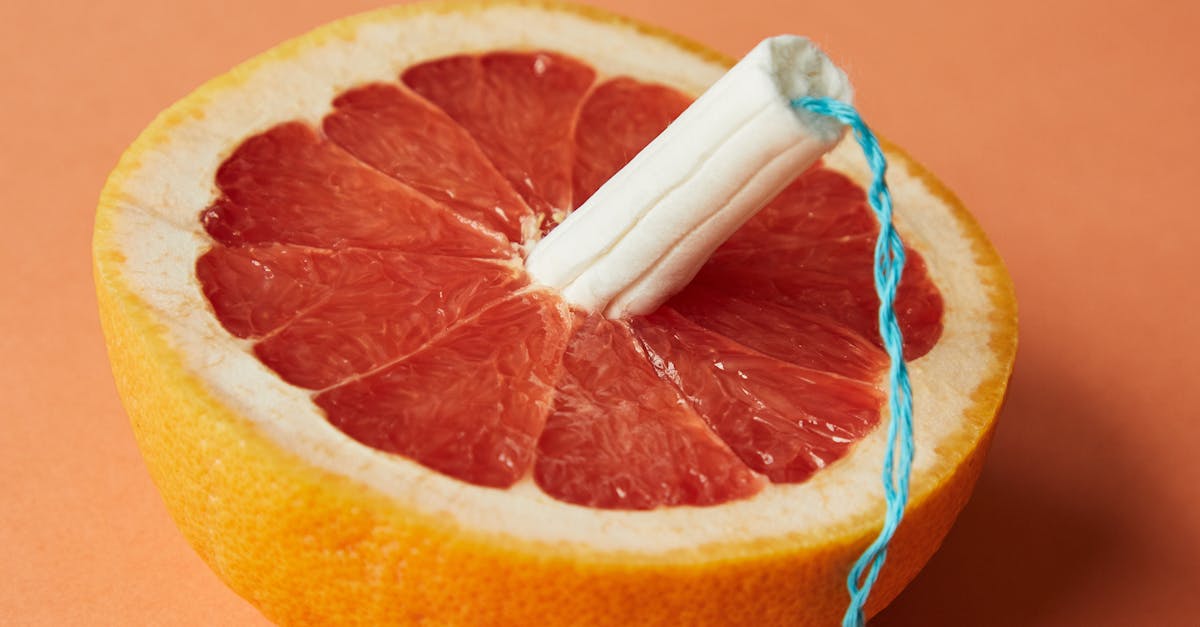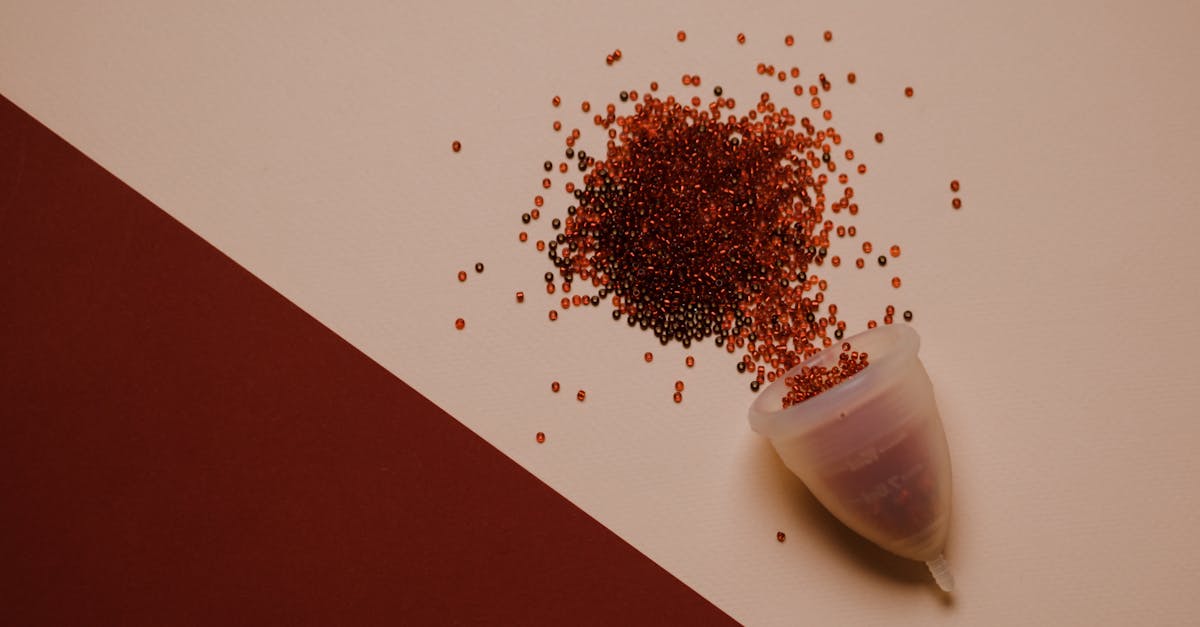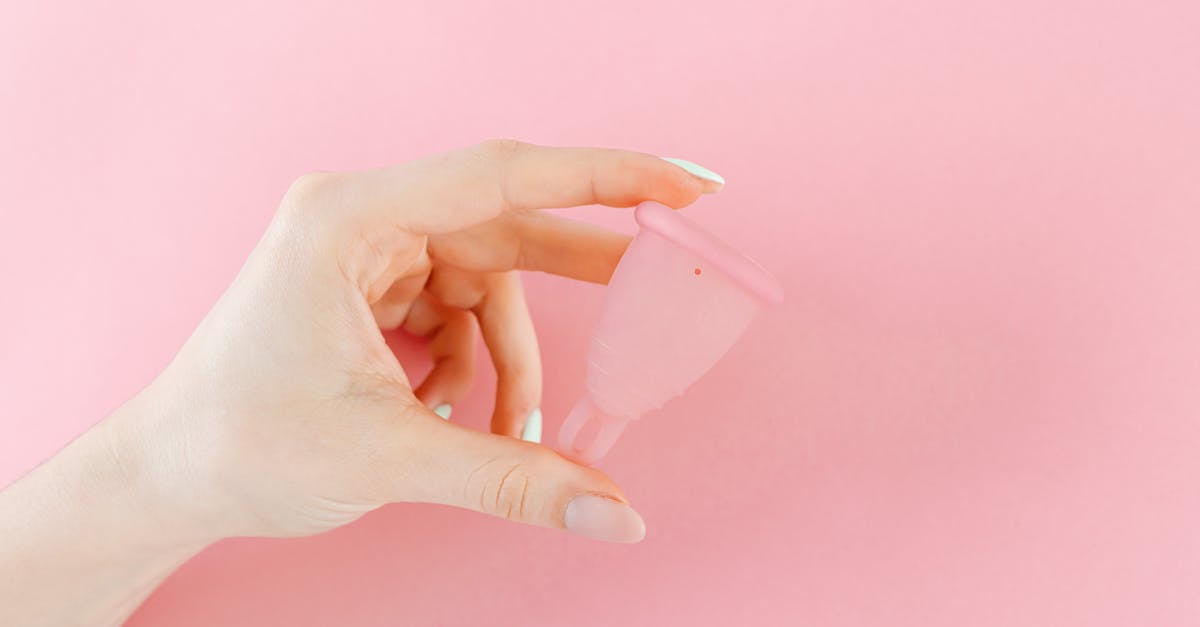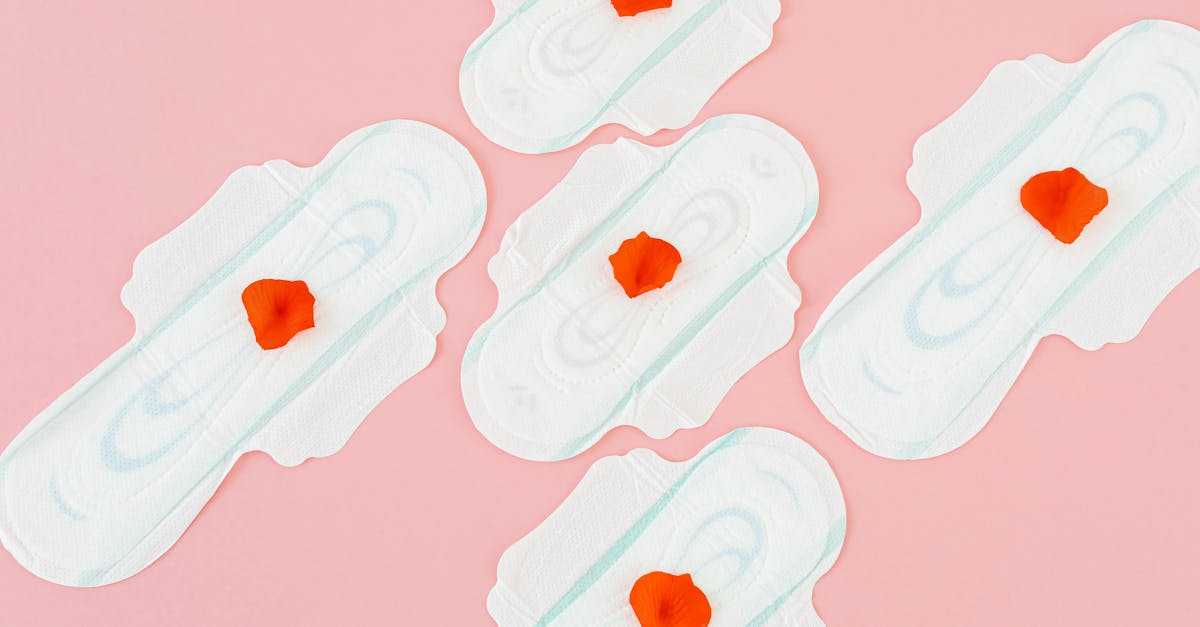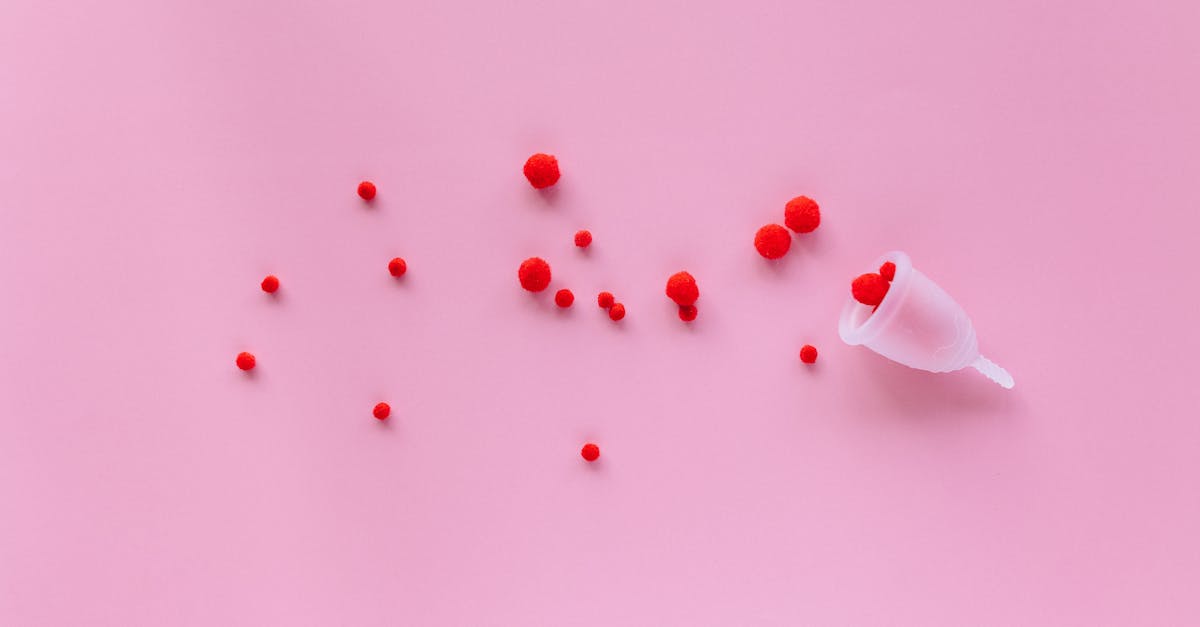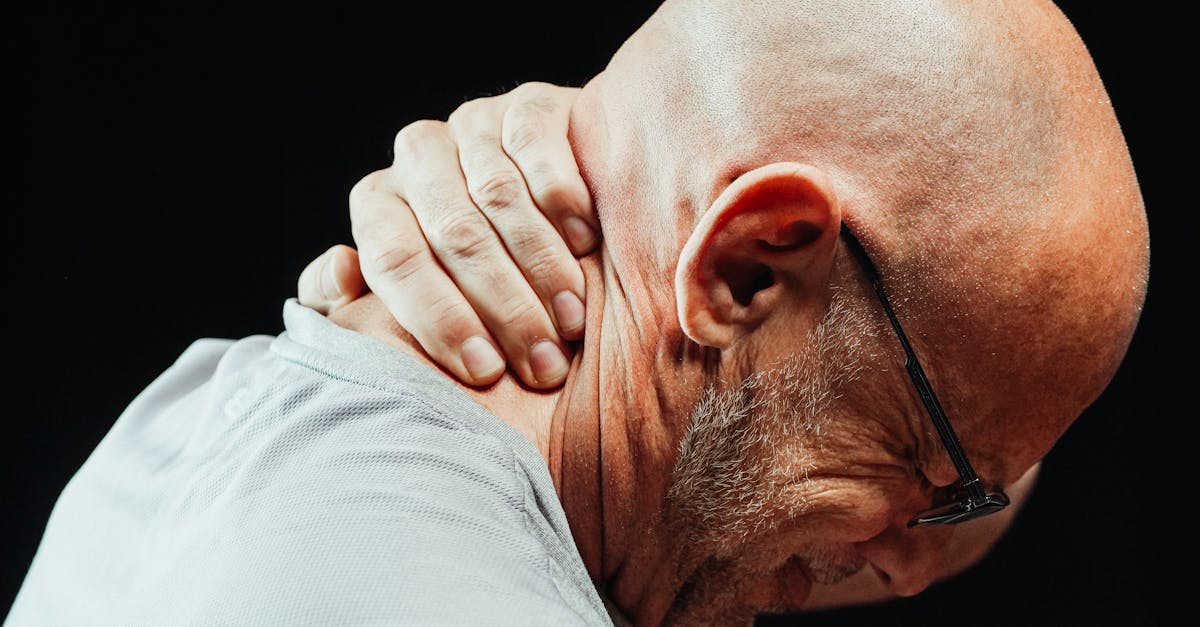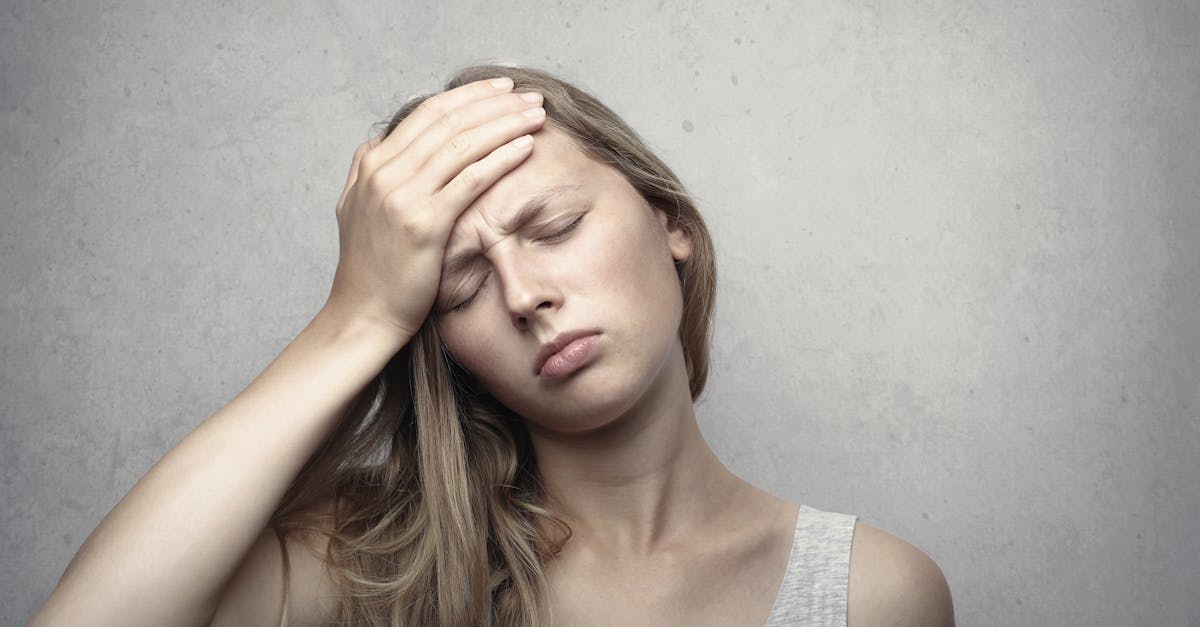Souffrez-vous de migraines menstruelles qui vous causent douleur et inconfort ?
In Short: Les migraines menstruelles créent un véritable calvaire, rendant certaines journées difficiles à gérer. Découvrez des techniques efficaces pour soulager la migraine et réduire considérablement la douleur . Pulse Align propose une approche innovante de recalibration posturelle, visant à améliorer votre bien-être général. Vous découvrirez également des remèdes naturels contre les maux de tête , vous aidant à identifier les facteurs déclencheurs de migraines . Reprenez le contrôle et vivez votre cycle de manière plus sereine. Prenez rendez-vous dès aujourd’hui à nos cliniques Pulse Align !
Êtes-vous aux prises avec des migraines menstruelles et à la recherche d’un cycle plus apaisé ?
Les migraines menstruelles touchent de nombreuses femmes et peuvent provoquer des douleurs insupportables et des symptômes désagréables. En explorant Pulse Align , vous découvrirez des techniques révolutionnaires qui favorisent un cycle plus apaisé et offrent un soulagement des maux de tête par des méthodes naturelles. Grâce à une approche holistique, nous vous aidons à identifier les déclencheurs de migraine et à gérer la douleur migraineuse , tout en vous permettant de vous concentrer sur l’amélioration de votre posture et le renforcement du tronc. N’attendez plus pour retrouver un bien-être durable et faire face à ces maux de tête qui perturbent vos journées.
« `html
Menstrual Migraines : Explorer Pulse Align pour Promouvoir un Cycle plus Apaisé
Dans notre monde moderne, il est essentiel d’embrasser un bien-être holistique, surtout lorsque l’on parle d’amélioration de la posture et de rétablissement de l’équilibre fonctionnel . Ce voyage vers un état de bien-être est enrichi grâce à des approches novatrices comme la recalibration neuromusculaire proposée par Pulse Align. Cette méthode, alliant des techniques douces et des stimulations effectives, vise à promouvoir l’équilibre naturel de votre corps.
Découvrez l’Approche de Pulse Align
Au cœur de l’approche de Pulse Align se trouve une profonde compréhension du corps humain. Nous croyons que chaque client mérite de retrouver son équilibre naturel sans interventions invasives. Nos techniques de stimulation douce sont conçues pour favoriser la symétrie musculaire et renforcer la posture , permettant ainsi un retour à une harmonie corporelle essentielle. Les clients découvrent que leur corps peut s’auto-réparer naturellement tout en bénéficiant d’un soutien à chaque étape de leur parcours.
Les Bienfaits Holistiques de notre Méthode
Pulse Align se concentre sur les capacités naturelles du corps à guérir par lui-même. Nos clients rapportent souvent une amélioration significative de leur bien-être , leur flexibilité , et une réduction des tensions. Grâce à cette approche holistique, nous incitons le corps à retrouver son équilibre de manière naturelle, sans utiliser de termes médicaux ni faire de promesses de traitements. En favorisant un environnement où la tranquilité et l’équilibre s’épanouissent, Pulse Align devient un choix évident pour ceux cherchant à améliorer leur qualité de vie.
Ce Que Nos Clients Disent
Les témoignages de nos clients révèlent combien nos services changent des vies. Une cliente a partagé : « J’ai remarqué une amélioration de ma posture naturellement et une réduction de la tension autour de mon cou après quelques sessions. » Ces récits illustrent comment notre méthode aide à rétablir l’harmonie corporelle, favorisant un bien-être plus significatif.
Prendre Rendez-vous avec Pulse Align
Êtes-vous prêt à faire le premier pas vers une vie plus équilibrée ? Découvrez comment Pulse Align peut soutenir votre parcours vers le bien-être en réservant une consultation dès aujourd’hui. Trouvez une clinique Pulse Align près de chez vous à Montreal , La Prairie , Terrebonne , Chicoutimi , Charlesbourg , Saint-Jérôme , Châteauguay , Sainte-Marie , Les Escoumins , Granby ou Panama City . N’oubliez pas : Pulse Align complète vos soins de santé actuels et encourage l’équilibre et la santé. Pour plus d’informations, rendez-vous sur notre site et prenez rendez-vous dès maintenant !
Migraines menstruelles : explorer Pulse Align pour promouvoir un cycle plus apaisé
Symptômes : Douleurs intenses, nausées et sensibilité à la lumière.Déclencheurs : Changements hormonaux, stress et certaines nourritures.Approche Pulse Align : Techniques douces pour rétablir l’équilibre corporel.Solutions naturelles : Huiles essentielles et exercices de relaxation.Rééquilibrage musculaire : Renforcement du tronc et amélioration de la posture.Soutien communautaire : Écoute active et partage d’expériences.Plan personnalisé : Stratégies adaptées pour chaque individu.Les migraines menstruelles peuvent perturber considérablement le bien-être des femmes, accompagnées souvent de douleurs intenses derrière les yeux, de nausées avec maux de tête et d’autres symptômes dérangeants. Pulse Align se présente comme une solution holistique prometteuse pour atténuer ces souffrances grâce à des techniques de recalibrage neuromusculaire. Cet article vous propose un aperçu des méthodes offertes par Pulse Align, mettant en avant l’importance de la santé neuromusculaire , de la correction de posture et de la recalibration naturelle.
Comprendre les migraines menstruelles et leurs déclencheurs
Les migraines menstruelles sont souvent liées aux fluctuations hormonales qui surviennent avant ou pendant le cycle. Ces maux de tête peuvent être aggravés par des facteurs tels que le stress, certains aliments ou des changements de mode de vie. En comprenant les déclencheurs de migraine , comme les aliments qui provoquent des migraines, les individus peuvent gérer leurs symptômes plus efficacement. La mise en place d’un régime alimentaire anti-migraine , associé à des remèdes naturels, peut aussi contribuer à la relief des migraines .
L’approche holistique de Pulse Align
Chez Pulse Align, nous croyons fermement qu’une approche holistique est essentielle pour traiter les maux de tête . Nos techniques de recalibration neuromusculaire reposent sur la stimulation douce des muscles pour aider le corps à retrouver son équilibre naturel. En mettant l’accent sur la correction de la posture et le , nous offrons des méthodes visant à réduire la tension dans le cou et le dos, souvent à l’origine de maux de tête de tension .
Exercices efficaces pour un soulagement optimal
Les exercices de tronc peuvent être particulièrement bénéfiques pour les personnes souffrant de migraines menstruelles . Parmi les exercices couramment recommandés, on trouve ceux qui renforcent le tronc tout en améliorant la posture. Des variations de ces exercices s’adaptent à différents niveaux de condition physique, rendant cette pratique accessible à tous. Par exemple, des exercices de correction posturale et des techniques comme la thérapie par onde de choc peuvent contribuer à soulager les douleurs chroniques tout en améliorant la posture et en encourageant le bien-être global.
Le soutien communautaire chez Pulse Align
Sur notre plateforme, vous serez entouré par une communauté supportive où chaque voix compte. Nos clients partagent souvent leurs expériences, témoignant de l’efficacité de notre approche. En vous joignant à nous, vous aurez l’occasion d’explorer des stratégies qui favorisent la symétrie musculaire et la recalibration naturelle pour mieux gérer vos céphalées . Que ce soit en ville, à Montréal , à La Prairie ou à Panama City , il existe un espace pour vous aider à retrouver votre rythme.
Prendre action : réservez votre consultation
Êtes-vous prête à découvrir comment Pulse Align peut transformer votre expérience des migraines menstruelles ? Nous vous encourageons à réserver une consultation pour apprendre davantage sur nos plans d’exercice personnalisés et nos méthodes de thérapie holistique . Embrassez la voie vers un cycle plus apaisé et une vie plus harmonieuse. Ne laissez pas les migraines dicter votre existence – agissez dès maintenant !
Comparaison des Méthodes pour Soulager les Migraines Menstruelles
Méthode
Description
Pulse Align
Approche holistique qui utilise des techniques de stimulation douce pour rétablir l’équilibre du corps et atténuer les symptômes des migraines menstruelles.
Compléments alimentaires
Utilisation de vitamines et de minéraux spécifiques pour réduire la fréquence et l’intensité des migraines.
Exercices de posture
Pratique d’exercices ciblant l’amélioration de la posture et le renforcement des muscles pour diminuer la tension.
Aromathérapie
Emploi d’huiles essentielles telles que la lavande pour favoriser la relaxation et réduire les symptômes.
Gestion du stress
Techniques telles que la méditation ou le yoga pour minimiser l’impact du stress sur les cycles menstruels.
Alimentation
Adoption d’une diète équilibrée pour identifier et éviter les aliments déclencheurs des migraines.
Consultation médicale
Rencontre avec un professionnel de santé pour discuter des options de traitement et de gestion des migraines.
Thérapie physiques
Sessions de massages et de thérapies manuelles pour soulager la douleur et favoriser la détente musculaire.
Techniques de relaxation
Exercices de respiration et de relaxation musculaire pour aider à gérer la douleur associée aux migraines.
Suivi communautaire
Participation à des groupes de soutien pour partager des expériences et des conseils utiles sur la gestion des migraines.
Les témoignages de nos clients : Un parcours de bien-être avec Pulse Align
« En tant que femme souffrant de migraines menstruelles , j’ai longtemps cherché des solutions pour soulager mes douleurs. En découvrant Pulse Align, j’ai trouvé un véritable soutien. Leur approche unique m’a permis de rééquilibrer mon corps naturellement. Après quelques séances, j’ai ressenti une amélioration significative de mon bien-être. J’encourage toutes les femmes à visiter Pulse Align à Chicoutimi pour découvrir cette méthode incroyable! » – Claire L.
« La méthode de Pulse Align est révolutionnaire! En tant que résidente de Mont-Royal , j’ai pu vivre une transformation incroyable. Non seulement cela a aidé mes migraines, mais cela a également eu un effet positif sur ma posture et ma vitalité . Je me sens plus équilibrée et apaisée chaque mois. Je recommande vivement leurs services à toute personne cherchant à améliorer son bien-être. » – Marc D.
« En quête d’une solution pour mes migraines menstruelles , j’ai découvert Pulse Align à La Prairie. Leur approche subtile pour promouvoir la guérison naturelle est vraiment efficace! J’ai constaté une diminution de mes symptômes et une amélioration de ma qualité de vie. Je suis très reconnaissante d’avoir accès à cette clinique qui soutient les femmes comme moi. » – Sophie T.
« Comme résidente de Terrebonne , je suis ravie d’avoir trouvé Pulse Align. Leur engagement à aider à restaurer l’équilibre du corps est remarquable. Après plusieurs sessions, mes migraines sont devenues plus gérables, et je me sens beaucoup mieux pendant mon cycle. Merci à l’équipe de Pulse Align pour leur soutien incroyable! » – Julie R.
« J’ai toujours lutté contre des migraine s menstruelles intenses. Grâce à Pulse Align, j’ai redécouvert le potentiel de guérison de mon corps. Leur méthode m’a aidé à réajuster ma posture, contribuant ainsi à atténuer mes douleurs. Pour ceux qui vivent à Châteauguay , je vous encourage vraiment à explorer leurs services. Vous ne serez pas déçus! » – Léa M.
Pulse Align collabore étroitement avec les équipes de soins de santé de la région pour garantir un parcours de bien-être enrichissant pour tous. Si vous êtes dans des endroits comme Sainte-Marie , Chicoutimi ou même Saint-Jérôme , vous pouvez trouver des cliniques près de chez vous. Découvrez plus sur notre site et avancez vers un avenir plus sain en visitant Nos Cliniques . »
Pulse Align clinics sont dédiés à améliorer la qualité de vie des patients grâce à des solutions de santé innovantes et intégratives. En combinant des technologies de pointe avec des thérapies personnalisées, ces cliniques se concentrent sur l’identification des causes profondes de divers problèmes musculosquelettiques, de douleurs chroniques et d’autres préoccupations de santé. Les patients peuvent s’attendre à un environnement accueillant, un accompagnement compétent et un plan complet adapté à leurs besoins uniques, le tout conçu pour favoriser un bien-être à long terme et un style de vie plus actif.
Notre Mission
Chez Pulse Align, notre mission est de fournir des traitements basés sur des preuves et centrés sur le client, qui s’attaquent aux causes sous-jacentes de la douleur et de la dysfonction. En intégrant des techniques et des technologies avancées, nous nous efforçons d’habiliter chaque personne à prendre le contrôle de sa santé, en garantissant un niveau élevé de soins, un soulagement durable et une amélioration de la qualité de vie.
Pour en savoir plus sur notre approche et les services disponibles, visitez notre site web à www.pulsealign.com et trouvez un emplacement près de chez vous ici : https://pulsealign.com/our-locations/ .
TAGMED’s Spinal Decompression Therapy: A Non-Surgical Solution for Chronic Pain
TAGMED offers advanced Spinal Decompression Therapy , a non-surgical solution designed specifically to address moderate-to-severe disc issues such as herniated discs , bulging discs , and conditions related to spinal stenosis . This specialized technique works by gently reducing pressure on the affected discs and nerves, enhancing mobility, alleviating pain, and supporting your body’s natural healing process. If you’ve reached a plateau with other therapies, discover how TAGMED’s evidence-based decompression approach can help you resume an active, comfortable life.
Have you tried conventional treatments and still struggle with persistent back pain due to a severe disc condition?
Mechanism of Action
TAGMED’s neurovertebral decompression applies a controlled, progressive traction force to the spine. This innovative method increases the space between vertebrae, which translates to reduced pressure on intervertebral discs and nerve roots. By promoting better fluid circulation in the targeted area, TAGMED’s approach effectively helps lower inflammation and relieve pain. This makes it a reliable, non-invasive solution for individuals suffering from chronic back issues.
Specific Benefits
This non-invasive approach effectively alleviates chronic pain and symptoms linked to conditions like herniated discs or spinal stenosis . By specifically targeting and reducing pressure on nerve structures and optimizing fluid circulation around the discs, TAGMED’s therapy can speed up recovery times and enhance the quality of life for a wide variety of patients looking for relief from persistent discomfort.
Comparison with Other Treatments
When comparing TAGMED’s neurovertebral decompression technology to other commonly used treatments, such as pain medications, corticosteroid injections, or traditional physiotherapy, several distinct advantages emerge. This approach is non-invasive, minimizing medication-related risks and avoiding the need for aggressive interventions. Furthermore, with its emphasis on restoring natural balance within the body, neurovertebral decompression presents a potentially faster path to recovery, making it an appealing choice for those seeking safer, evidence-based alternatives.
Case Studies or Testimonials
Many patients have reported significant improvements after undergoing TAGMED’s neurovertebral decompression therapy . For instance, one patient noted, “After trying multiple treatments for my sciatica , I finally found relief with TAGMED. The pain I struggled with for years has significantly diminished. I can resume my daily activities without fear.” These firsthand accounts highlight tangible results and the practical advantages of this therapeutic approach.
Conclusion sur les migraines menstruelles : Explorer Pulse Align pour promouvoir un cycle plus apaisé
En explorant le monde de Pulse Align , vous découvrirez un approche holistique conçue pour améliorer votre bien-être général. Les bienfaits sont multiples : une correction posturale qui favorise une posture adéquate, une réduction de l’inconfort, une augmentation de la mobilité, et un élan vers un bien-être rehaussé. Pulse Align a pour but de soutenir votre corps avec des méthodes douces qui favorisent votre capacité innée à guérir.
Les témoignages de clients illustrent clairement l’impact positif de Pulse Align sur leur quotidien. Les expériences partagées révèlent une satisfaction notoire face à leur cheminement vers un mieux-être, renforçant ainsi la valeur d’une communauté attentionnée et accueillante. Grâce à cette approche empathique, les clients sont encouragés à reprendre le contrôle de leur santé et à embrasser leur parcours.
Pour ceux qui aspirent à un soulagement naturel de la douleur et à une amélioration de leur santé globale, nous vous invitons à découvrir la différence Pulse Align dès aujourd’hui. Programme votre consultation maintenant et faites le premier pas vers une vie plus équilibrée et harmonieuse. N’oubliez pas, chez Pulse Align, nous sommes là pour vous soutenir dans votre voyage vers le bien-être naturel.
Do you suffer from a chronic condition that responds little or not at all to conservative treatments?
Pulse Align est une méthode innovante et non invasive qui aide à restaurer l’équilibre et la posture naturels du corps grâce à de douces pulsations imperceptibles. Ce processus aide à réduire les tensions musculaires et articulaires, offrant une approche naturelle pour favoriser un expérience mensuelle apaisée. En explorant les techniques de Pulse Align, les clients découvrent une alternative efficace pour améliorer leur bien-être, en mettant l’accent sur le rétablissement de l’équilibre musculaire et une posture harmonieuse.
Contrairement à d’autres méthodes qui se concentrent sur l’inconfort ou les conditions de santé, Pulse Align aide le corps à se recalibrer de manière naturelle. Ce processus favorise souvent des améliorations étonnantes, notamment une sensation de bien-être, un meilleur confort et une posture corrigée. Les méthodes douces de Pulse Align visent à soutenir les clients dans leur cheminement vers un mieux-être global sans prétendre traiter directement des symptômes.
Chez Pulse Align, chaque client bénéficie d’une approche personnalisée. De nombreux témoignages révèlent que les clients ont constaté des améliorations notables de leur confort, ainsi qu’une réduction de la tension au niveau du cou et du dos. Ils ont également mentionné une sensation de bien-être renforcée et une posture plus équilibrée, ce qui leur permet de vivre leur vie quotidienne plus sereinement. Ces récits illustrent à quel point une approche douce et évolutive peut transformer l’expérience de bien-être de nos clients.
Nous vous invitons à visiter notre site web pour en savoir plus sur les services de Pulse Align, à trouver des emplacements à proximité comme La Prairie, Mont-Royal, Terrebonne, et à réserver une consultation pour vous et votre famille. Il est important de mentionner que Pulse Align fonctionne en complément des services de santé existants. Notre méthode ne remplace pas les recommandations médicales ; elle les complète pour un meilleur soutien au bien-être.
Pour découvrir comment Pulse Align peut contribuer à votre parcours de mieux-être et à celui de vos proches, visitez notre site pour prendre rendez-vous en ligne dès aujourd’hui. Profitez d’une approche familiale, douce et non invasive en vous rendant sur Pulse Align !
Frequently Asked Questions
Maux de tête et migraines
Les odeurs fortes déclenchent-elles des migraines ?
Pour certaines personnes, des odeurs puissantes (parfum, solvant) peuvent provoquer ou aggraver une crise.
Les migraines peuvent-elles être accompagnées de nausées ?
Oui, des nausées et parfois des vomissements sont fréquents pendant une crise de migraine.
La coenzyme Q10 ou le magnésium aident-ils ?
Certaines études suggèrent que la supplémentation en magnésium ou en coenzyme Q10 peut réduire la fréquence des migraines.
La déshydratation cause-t-elle des maux de tête ?
Oui, un manque d’hydratation adéquate peut provoquer des maux de tête et aggraver les migraines.
Les écrans filtrant la lumière bleue sont-ils utiles ?
Ils réduisent la fatigue visuelle, pouvant ainsi diminuer le risque de déclenchement d’un mal de tête.
Les personnes souffrant de migraines doivent-elles éviter l’alcool ?
L’alcool, surtout le vin rouge, peut déclencher une crise chez certaines personnes. Il est conseillé d’identifier et d’éviter les déclencheurs individuels.
Les changements de météo provoquent-ils des migraines ?
Oui, certaines personnes sont sensibles aux variations de pression atmosphérique, d’humidité ou de température.
Les migraines peuvent-elles être confondues avec d’autres pathologies ?
Oui, certaines migraines imitent des symptômes d’AVC ou de sinusite. Un diagnostic médical est parfois nécessaire.
Les thérapies alternatives (acupuncture) sont-elles utiles ?
Certaines personnes trouvent du soulagement avec l’acupuncture, bien que l’efficacité varie d’un individu à l’autre.
Le manque de sommeil peut-il provoquer des migraines ?
Oui, un sommeil insuffisant ou de mauvaise qualité est un facteur déclenchant courant des crises de migraine.
Simon Bertrand is dedicated to shining a light on the hidden struggles of chronic headaches. As a Headache Awareness Advocate at Pulse Align, he combines compassionate storytelling with cutting-edge research to bring clarity, comfort, and hope to those affected. Simon’s mission is to empower readers with knowledge, break through stigma, and foster a supportive community where every voice is heard. When he’s not crafting insightful articles, Simon can be found exploring the latest wellness trends, sharing practical coping strategies, or simply lending a listening ear to those in need. His heartfelt approach and unwavering commitment to awareness make him a trusted ally for anyone navigating life with headaches.
Medical Disclaimer
The information and advice provided on this site do not replace the advice, diagnosis, or treatment of a healthcare professional. Please note that the author of this article is neither a doctor nor a specialist in a medical specialty as defined by the Collège des médecins du Québec. Manual medicine, functional medicine, and sports medicine as described on this site exclude any medical treatment or diagnosis made by a doctor or medical specialist. Always consult your doctor for any medical questions. For more details, please read our complete Legal Notice .
References No parsed citations found. Full shortcode output:
722490
MDAVM6MK
1
apa
20
default
12004
https://pulsealignchateauguay.com/wp-content/plugins/zotpress/
%7B%22status%22%3A%22success%22%2C%22updateneeded%22%3Afalse%2C%22instance%22%3Afalse%2C%22meta%22%3A%7B%22request_last%22%3A0%2C%22request_next%22%3A0%2C%22used_cache%22%3Atrue%7D%2C%22data%22%3A%5B%7B%22key%22%3A%22474E5C2I%22%2C%22library%22%3A%7B%22id%22%3A722490%7D%2C%22meta%22%3A%7B%22creatorSummary%22%3A%22Al-Khazali%20et%20al.%22%2C%22parsedDate%22%3A%222024%22%2C%22numChildren%22%3A1%7D%2C%22bib%22%3A%22%26lt%3Bdiv%20class%3D%26quot%3Bcsl-bib-body%26quot%3B%20style%3D%26quot%3Bline-height%3A%202%3B%20padding-left%3A%201em%3B%20text-indent%3A-1em%3B%26quot%3B%26gt%3B%5Cn%20%20%26lt%3Bdiv%20class%3D%26quot%3Bcsl-entry%26quot%3B%26gt%3BAl-Khazali%2C%20H.%20M.%2C%20Al-Sayegh%2C%20Z.%2C%20Younis%2C%20S.%2C%20Christensen%2C%20R.%20H.%2C%20Ashina%2C%20M.%2C%20Schytz%2C%20H.%20W.%2C%20%26amp%3B%20Ashina%2C%20S.%20%282024%29.%20Systematic%20review%20and%20meta-analysis%20of%20Neck%20Disability%20Index%20and%20Numeric%20Pain%20Rating%20Scale%20in%20patients%20with%20migraine%20and%20tension-type%20headache.%20%26lt%3Bi%26gt%3BCephalalgia%26lt%3B%5C%2Fi%26gt%3B%2C%20%26lt%3Bi%26gt%3B44%26lt%3B%5C%2Fi%26gt%3B%288%29%2C%2003331024241274266.%20%26lt%3Ba%20class%3D%26%23039%3Bzp-DOIURL%26%23039%3B%20href%3D%26%23039%3Bhttps%3A%5C%2F%5C%2Fdoi.org%5C%2F10.1177%5C%2F03331024241274266%26%23039%3B%26gt%3Bhttps%3A%5C%2F%5C%2Fdoi.org%5C%2F10.1177%5C%2F03331024241274266%26lt%3B%5C%2Fa%26gt%3B%26lt%3B%5C%2Fdiv%26gt%3B%5Cn%26lt%3B%5C%2Fdiv%26gt%3B%22%2C%22data%22%3A%7B%22itemType%22%3A%22journalArticle%22%2C%22title%22%3A%22Systematic%20review%20and%20meta-analysis%20of%20Neck%20Disability%20Index%20and%20Numeric%20Pain%20Rating%20Scale%20in%20patients%20with%20migraine%20and%20tension-type%20headache%22%2C%22creators%22%3A%5B%7B%22creatorType%22%3A%22author%22%2C%22firstName%22%3A%22Haidar%20M.%22%2C%22lastName%22%3A%22Al-Khazali%22%7D%2C%7B%22creatorType%22%3A%22author%22%2C%22firstName%22%3A%22Zainab%22%2C%22lastName%22%3A%22Al-Sayegh%22%7D%2C%7B%22creatorType%22%3A%22author%22%2C%22firstName%22%3A%22Samaira%22%2C%22lastName%22%3A%22Younis%22%7D%2C%7B%22creatorType%22%3A%22author%22%2C%22firstName%22%3A%22Rune%20H.%22%2C%22lastName%22%3A%22Christensen%22%7D%2C%7B%22creatorType%22%3A%22author%22%2C%22firstName%22%3A%22Messoud%22%2C%22lastName%22%3A%22Ashina%22%7D%2C%7B%22creatorType%22%3A%22author%22%2C%22firstName%22%3A%22Henrik%20W.%22%2C%22lastName%22%3A%22Schytz%22%7D%2C%7B%22creatorType%22%3A%22author%22%2C%22firstName%22%3A%22Sait%22%2C%22lastName%22%3A%22Ashina%22%7D%5D%2C%22abstractNote%22%3A%22Background%5Cn%20%20%20%20%20%20%20%20%20%20%20%20%20%20The%20present%20study%20aimed%20to%20assess%20the%20burden%20of%20neck%20pain%20in%20adults%20with%20migraine%20and%20tension-type%20headache%20%28TTH%29%2C%20utilizing%20the%20Neck%20Disability%20Index%20%28NDI%29%20and%20Numeric%20Pain%20Rating%20Scale%20%28NPRS%29.%5Cn%20%20%20%20%20%20%20%20%20%20%20%20%5Cn%20%20%20%20%20%20%20%20%20%20%20%20%5Cn%20%20%20%20%20%20%20%20%20%20%20%20%20%20Methods%5Cn%20%20%20%20%20%20%20%20%20%20%20%20%20%20%5Cn%20%20%20%20%20%20%20%20%20%20%20%20%20%20%20%20A%20systematic%20literature%20search%20was%20conducted%20on%20PubMed%20and%20Embase%20to%20identify%20observational%20studies%20assessing%20NDI%20and%20NPRS%20in%20populations%20with%20migraine%20or%20TTH.%20The%20screening%20of%20articles%20was%20independently%20performed%20by%20two%20investigators%20%28HMA%20and%20ZA%29.%20Pooled%20mean%20estimates%20were%20calculated%20through%20random-effects%20meta-analysis.%20The%20I%5Cn%20%20%20%20%20%20%20%20%20%20%20%20%20%20%20%202%5Cn%20%20%20%20%20%20%20%20%20%20%20%20%20%20%20%20statistic%20assessed%20between-study%20heterogeneity%2C%20and%20meta-regression%20further%20explored%20heterogeneity%20factors.%5Cn%20%20%20%20%20%20%20%20%20%20%20%20%20%20%5Cn%20%20%20%20%20%20%20%20%20%20%20%20%5Cn%20%20%20%20%20%20%20%20%20%20%20%20%5Cn%20%20%20%20%20%20%20%20%20%20%20%20%20%20Results%5Cn%20%20%20%20%20%20%20%20%20%20%20%20%20%20%5Cn%20%20%20%20%20%20%20%20%20%20%20%20%20%20%20%20Thirty-three%20clinic-based%20studies%20met%20the%20inclusion%20criteria.%20For%20participants%20with%20migraine%2C%20the%20pooled%20mean%20NDI%20score%20was%2016.2%20%2895%25%20confidence%20interval%20%28CI%29%20%3D%2013.2%5Cu201319.2%2C%20I%5Cn%20%20%20%20%20%20%20%20%20%20%20%20%20%20%20%202%5Cu2009%5Cn%20%20%20%20%20%20%20%20%20%20%20%20%20%20%20%20%3D%5Cu200999%25%29.%20Additionally%2C%20the%20mean%20NDI%20was%205.5%20%2895%25%20CI%20%3D%204.11%5Cu20136.8%2C%20p%5Cu2009%26lt%3B%5Cu20090.001%29%20scores%20higher%20in%20participants%20with%20chronic%20compared%20to%20episodic%20migraine.%20The%20pooled%20mean%20NDI%20score%20for%20participants%20with%20TTH%20was%2013.7%20%2895%25%20CI%20%3D%204.9%5Cu201322.4%2C%20I%5Cn%20%20%20%20%20%20%20%20%20%20%20%20%20%20%20%202%5Cu2009%5Cn%20%20%20%20%20%20%20%20%20%20%20%20%20%20%20%20%3D%5Cu200999%25%29.%20In%20addition%2C%20the%20meta-analysis%20revealed%20a%20mean%20NPRS%20score%20of%205.7%20%2895%25%20CI%20%3D%205.1%5Cu20136.2%2C%20I%5Cn%20%20%20%20%20%20%20%20%20%20%20%20%20%20%20%202%5Cn%20%20%20%20%20%20%20%20%20%20%20%20%20%20%20%20%5Cu2009%3D%5Cu200995%25%29%20across%20all%20participants%20with%20migraine.%5Cn%20%20%20%20%20%20%20%20%20%20%20%20%20%20%5Cn%20%20%20%20%20%20%20%20%20%20%20%20%5Cn%20%20%20%20%20%20%20%20%20%20%20%20%5Cn%20%20%20%20%20%20%20%20%20%20%20%20%20%20Conclusions%5Cn%20%20%20%20%20%20%20%20%20%20%20%20%20%20This%20systematic%20review%20and%20meta-analysis%20shows%20a%20greater%20degree%20of%20neck%20pain-related%20disability%20in%20migraine%20compared%20to%20TTH.%20Nevertheless%2C%20the%20generalizability%20of%20these%20findings%20is%20constrained%20by%20methodological%20variations%20identified%20in%20the%20current%20literature.%22%2C%22date%22%3A%2208%5C%2F2024%22%2C%22language%22%3A%22en%22%2C%22DOI%22%3A%2210.1177%5C%2F03331024241274266%22%2C%22ISSN%22%3A%220333-1024%2C%201468-2982%22%2C%22url%22%3A%22https%3A%5C%2F%5C%2Fjournals.sagepub.com%5C%2Fdoi%5C%2F10.1177%5C%2F03331024241274266%22%2C%22collections%22%3A%5B%22MDAVM6MK%22%5D%2C%22dateModified%22%3A%222024-12-16T17%3A38%3A46Z%22%7D%7D%2C%7B%22key%22%3A%22UL3PWZM8%22%2C%22library%22%3A%7B%22id%22%3A722490%7D%2C%22meta%22%3A%7B%22creatorSummary%22%3A%22Fern%5Cu00e1ndez%5Cu2010de%5Cu2010las%5Cu2010Pe%5Cu00f1as%20et%20al.%22%2C%22parsedDate%22%3A%222007%22%2C%22numChildren%22%3A1%7D%2C%22bib%22%3A%22%26lt%3Bdiv%20class%3D%26quot%3Bcsl-bib-body%26quot%3B%20style%3D%26quot%3Bline-height%3A%202%3B%20padding-left%3A%201em%3B%20text-indent%3A-1em%3B%26quot%3B%26gt%3B%5Cn%20%20%26lt%3Bdiv%20class%3D%26quot%3Bcsl-entry%26quot%3B%26gt%3BFern%26%23xE1%3Bndez%26%23x2010%3Bde%26%23x2010%3Blas%26%23x2010%3BPe%26%23xF1%3Bas%2C%20C.%2C%20Cuadrado%2C%20M.%20L.%2C%20%26amp%3B%20Pareja%2C%20J.%20A.%20%282007%29.%20Myofascial%20Trigger%20Points%2C%20Neck%20Mobility%2C%20and%20Forward%20Head%20Posture%20in%20Episodic%20Tension%26%23x2010%3BType%20Headache.%20%26lt%3Bi%26gt%3BHeadache%3A%20The%20Journal%20of%20Head%20and%20Face%20Pain%26lt%3B%5C%2Fi%26gt%3B%2C%20%26lt%3Bi%26gt%3B47%26lt%3B%5C%2Fi%26gt%3B%285%29%2C%20662%26%23x2013%3B672.%20%26lt%3Ba%20class%3D%26%23039%3Bzp-DOIURL%26%23039%3B%20href%3D%26%23039%3Bhttps%3A%5C%2F%5C%2Fdoi.org%5C%2F10.1111%5C%2Fj.1526-4610.2006.00632.x%26%23039%3B%26gt%3Bhttps%3A%5C%2F%5C%2Fdoi.org%5C%2F10.1111%5C%2Fj.1526-4610.2006.00632.x%26lt%3B%5C%2Fa%26gt%3B%26lt%3B%5C%2Fdiv%26gt%3B%5Cn%26lt%3B%5C%2Fdiv%26gt%3B%22%2C%22data%22%3A%7B%22itemType%22%3A%22journalArticle%22%2C%22title%22%3A%22Myofascial%20Trigger%20Points%2C%20Neck%20Mobility%2C%20and%20Forward%20Head%20Posture%20in%20Episodic%20Tension%5Cu2010Type%20Headache%22%2C%22creators%22%3A%5B%7B%22creatorType%22%3A%22author%22%2C%22firstName%22%3A%22C%5Cu00e9sar%22%2C%22lastName%22%3A%22Fern%5Cu00e1ndez%5Cu2010de%5Cu2010las%5Cu2010Pe%5Cu00f1as%22%7D%2C%7B%22creatorType%22%3A%22author%22%2C%22firstName%22%3A%22Maria%20L.%22%2C%22lastName%22%3A%22Cuadrado%22%7D%2C%7B%22creatorType%22%3A%22author%22%2C%22firstName%22%3A%22Juan%20A.%22%2C%22lastName%22%3A%22Pareja%22%7D%5D%2C%22abstractNote%22%3A%22Objective.%5Cu2014To%20assess%20the%20differences%20in%20the%20presence%20of%20trigger%20points%20%28TrPs%29%20in%20head%20and%20neck%20muscles%2C%20forward%20head%20posture%20%28FHP%29%20and%20neck%20mobility%20between%20episodic%20tension%5Cu2010type%20headache%20%28ETTH%29%20subjects%20and%20healthy%20controls.%20In%20addition%2C%20we%20assess%20the%20relationship%20between%20these%20muscle%20TrPs%2C%20FHP%2C%20neck%20mobility%2C%20and%20several%20clinical%20variables%20concerning%20the%20intensity%20and%20the%20temporal%20profile%20of%20headache.%5Cn%20%20%20%20%20%20%20%20%20%20%20%20Background.%5Cu2014TTH%20is%20a%20headache%20in%20which%20musculoskeletal%20disorders%20of%20the%20craniocervical%20region%20might%20play%20an%20important%20role%20in%20its%20pathogenesis.%5Cn%20%20%20%20%20%20%20%20%20%20%20%20Design.%5Cu2014A%20blinded%2C%20controlled%20pilot%20study.%5Cn%20%20%20%20%20%20%20%20%20%20%20%20Methods.%5Cu2014Fifteen%20ETTH%20subjects%20and%2015%20matched%20controls%20without%20headache%20were%20studied.%20TrPs%20in%20both%20upper%20trapezius%2C%20both%20sternocleidomastoids%2C%20and%20both%20temporalis%20muscles%20were%20identified%20according%20to%20Simons%20and%20Gerwin%20diagnostic%20criteria%20%28tenderness%20in%20a%20hypersensible%20spot%20within%20a%20palpable%20taut%20band%2C%20local%20twitch%20response%20elicited%20by%20snapping%20palpation%2C%20and%20elicited%20referred%20pain%20with%20palpation%29.%20Side%5Cu2010view%20pictures%20of%20each%20subject%20were%20taken%20in%20both%20sitting%20and%20standing%20positions%2C%20in%20order%20to%20assess%20FHP%20by%20measuring%20the%20craniovertebral%20angle.%20A%20cervical%20goniometer%20was%20employed%20to%20measure%20neck%20mobility.%20All%20measures%20were%20taken%20by%20a%20blinded%20assessor.%20A%20headache%20diary%20was%20kept%20for%204%20weeks%20in%20order%20to%20assess%20headache%20intensity%2C%20frequency%2C%20and%20duration.%5Cn%20%20%20%20%20%20%20%20%20%20%20%20%5Cn%20%20%20%20%20%20%20%20%20%20%20%20%20%20Results.%5Cu2014The%20mean%20number%20of%20TrPs%20for%20each%20ETTH%20subject%20was%203.7%20%28SD%3A%201.3%29%2C%20of%20which%201.9%20%28SD%3A%200.9%29%20were%20active%2C%20and%201.8%20%28SD%3A%200.9%29%20were%20latent.%20Control%20subjects%20only%20had%20latent%20TrPs%20%28mean%3A%201.5%3B%20SD%3A%201%29.%20TrP%20occurrence%20between%20the%202%20groups%20was%20significantly%20different%20for%20active%20TrPs%20%28%5Cn%20%20%20%20%20%20%20%20%20%20%20%20%20%20P%5Cn%20%20%20%20%20%20%20%20%20%20%20%20%20%20%26lt%3B%20.001%29%2C%20but%20not%20for%20latent%20TrPs%20%28%5Cn%20%20%20%20%20%20%20%20%20%20%20%20%20%20P%5Cn%20%20%20%20%20%20%20%20%20%20%20%20%20%20%26gt%3B%20.05%29.%20Differences%20in%20the%20distribution%20of%20TrPs%20were%20significant%20for%20the%20right%20upper%20trapezius%20muscles%20%28%5Cn%20%20%20%20%20%20%20%20%20%20%20%20%20%20P%5Cn%20%20%20%20%20%20%20%20%20%20%20%20%20%20%3D%20.04%29%2C%20the%20left%20sternocleidomastoid%20%28%5Cn%20%20%20%20%20%20%20%20%20%20%20%20%20%20P%5Cn%20%20%20%20%20%20%20%20%20%20%20%20%20%20%3D%20.03%29%2C%20and%20both%20temporalis%20muscles%20%28%5Cn%20%20%20%20%20%20%20%20%20%20%20%20%20%20P%5Cn%20%20%20%20%20%20%20%20%20%20%20%20%20%20%26lt%3B%20.001%29.%20Within%20the%20ETTH%20group%2C%20headache%20intensity%2C%20frequency%2C%20and%20duration%20outcomes%20did%20not%20differ%20depending%20on%20TrP%20activity%2C%20whether%20the%20TrP%20was%20active%20or%20latent.%20The%20craniovertebral%20angle%20was%20smaller%2C%20ie%2C%20there%20was%20a%20greater%20FHP%2C%20in%20ETTH%20patients%20than%20in%20healthy%20controls%20for%20both%20sitting%20and%20standing%20positions%20%28%5Cn%20%20%20%20%20%20%20%20%20%20%20%20%20%20P%5Cn%20%20%20%20%20%20%20%20%20%20%20%20%20%20%26lt%3B%20.05%29.%20ETTH%20subjects%20with%20active%20TrPs%20in%20the%20analyzed%20muscles%20had%20a%20greater%20FHP%20than%20those%20with%20latent%20TrPs%20in%20both%20sitting%20and%20standing%20positions%2C%20though%20differences%20were%20only%20significant%20for%20certain%20muscles.%20Finally%2C%20ETTH%20patients%20also%20showed%20lesser%20neck%20mobility%20than%20healthy%20controls%20in%20the%20total%20range%20of%20motion%20as%20well%20as%20in%20half%5Cu2010cycles%20%28except%20for%20cervical%20extension%29%2C%20although%20neck%20mobility%20did%20not%20seem%20to%20influence%20headache%20parameters.%5Cn%20%20%20%20%20%20%20%20%20%20%20%20%5Cn%20%20%20%20%20%20%20%20%20%20%20%20Conclusions.%5Cu2014Active%20TrPs%20in%20the%20upper%20trapezius%2C%20sternocleidomastoid%2C%20and%20temporalis%20muscles%20were%20more%20common%20in%20ETTH%20subjects%20than%20in%20healthy%20controls%2C%20although%20TrP%20activity%20was%20not%20related%20to%20any%20clinical%20variable%20concerning%20the%20intensity%20and%20the%20temporal%20profile%20of%20headache.%20ETTH%20patients%20showed%20greater%20FHP%20and%20lesser%20neck%20mobility%20than%20healthy%20controls%2C%20although%20both%20disorders%20were%20not%20correlated%20with%20headache%20parameters.%22%2C%22date%22%3A%2205%5C%2F2007%22%2C%22language%22%3A%22en%22%2C%22DOI%22%3A%2210.1111%5C%2Fj.1526-4610.2006.00632.x%22%2C%22ISSN%22%3A%220017-8748%2C%201526-4610%22%2C%22url%22%3A%22https%3A%5C%2F%5C%2Fheadachejournal.onlinelibrary.wiley.com%5C%2Fdoi%5C%2F10.1111%5C%2Fj.1526-4610.2006.00632.x%22%2C%22collections%22%3A%5B%22MDAVM6MK%22%5D%2C%22dateModified%22%3A%222024-12-16T17%3A38%3A46Z%22%7D%7D%2C%7B%22key%22%3A%22Q6L4ZIPK%22%2C%22library%22%3A%7B%22id%22%3A722490%7D%2C%22meta%22%3A%7B%22creatorSummary%22%3A%22Bjarne%22%2C%22parsedDate%22%3A%222024%22%2C%22numChildren%22%3A1%7D%2C%22bib%22%3A%22%26lt%3Bdiv%20class%3D%26quot%3Bcsl-bib-body%26quot%3B%20style%3D%26quot%3Bline-height%3A%202%3B%20padding-left%3A%201em%3B%20text-indent%3A-1em%3B%26quot%3B%26gt%3B%5Cn%20%20%26lt%3Bdiv%20class%3D%26quot%3Bcsl-entry%26quot%3B%26gt%3BBjarne%2C%20B.%20%282024%29.%20%26lt%3Bi%26gt%3BNECK%20MUSCLE%20ELASTICITY%20IN%20CERVICOGENIC%20HEADACHE%20PATIENTS%20MEASURED%20BY%20SHEAR%20WAVE%20ELASTOGRAPHY%26lt%3B%5C%2Fi%26gt%3B%20%5BPhD%20Thesis%2C%20Ghent%20University%5D.%20%26lt%3Ba%20class%3D%26%23039%3Bzp-ItemURL%26%23039%3B%20href%3D%26%23039%3Bhttps%3A%5C%2F%5C%2Flibstore.ugent.be%5C%2Ffulltxt%5C%2FRUG01%5C%2F003%5C%2F202%5C%2F979%5C%2FRUG01-003202979_2024_0001_AC.pdf%26%23039%3B%26gt%3Bhttps%3A%5C%2F%5C%2Flibstore.ugent.be%5C%2Ffulltxt%5C%2FRUG01%5C%2F003%5C%2F202%5C%2F979%5C%2FRUG01-003202979_2024_0001_AC.pdf%26lt%3B%5C%2Fa%26gt%3B%26lt%3B%5C%2Fdiv%26gt%3B%5Cn%26lt%3B%5C%2Fdiv%26gt%3B%22%2C%22data%22%3A%7B%22itemType%22%3A%22thesis%22%2C%22title%22%3A%22NECK%20MUSCLE%20ELASTICITY%20IN%20CERVICOGENIC%20HEADACHE%20PATIENTS%20MEASURED%20BY%20SHEAR%20WAVE%20ELASTOGRAPHY%22%2C%22creators%22%3A%5B%7B%22creatorType%22%3A%22author%22%2C%22firstName%22%3A%22Baele%22%2C%22lastName%22%3A%22Bjarne%22%7D%5D%2C%22abstractNote%22%3A%22%22%2C%22thesisType%22%3A%22PhD%20Thesis%22%2C%22university%22%3A%22Ghent%20University%22%2C%22date%22%3A%222024%22%2C%22language%22%3A%22%22%2C%22url%22%3A%22https%3A%5C%2F%5C%2Flibstore.ugent.be%5C%2Ffulltxt%5C%2FRUG01%5C%2F003%5C%2F202%5C%2F979%5C%2FRUG01-003202979_2024_0001_AC.pdf%22%2C%22collections%22%3A%5B%22MDAVM6MK%22%5D%2C%22dateModified%22%3A%222024-12-16T17%3A38%3A46Z%22%7D%7D%2C%7B%22key%22%3A%22F7EKBPTW%22%2C%22library%22%3A%7B%22id%22%3A722490%7D%2C%22meta%22%3A%7B%22creatorSummary%22%3A%22Fern%5Cu00e1ndez-de-las-Pe%5Cu00f1as%20et%20al.%22%2C%22parsedDate%22%3A%222010%22%2C%22numChildren%22%3A1%7D%2C%22bib%22%3A%22%26lt%3Bdiv%20class%3D%26quot%3Bcsl-bib-body%26quot%3B%20style%3D%26quot%3Bline-height%3A%202%3B%20padding-left%3A%201em%3B%20text-indent%3A-1em%3B%26quot%3B%26gt%3B%5Cn%20%20%26lt%3Bdiv%20class%3D%26quot%3Bcsl-entry%26quot%3B%26gt%3BFern%26%23xE1%3Bndez-de-las-Pe%26%23xF1%3Bas%2C%20C.%2C%20Madeleine%2C%20P.%2C%20Caminero%2C%20A.%2C%20Cuadrado%2C%20M.%2C%20Arendt-Nielsen%2C%20L.%2C%20%26amp%3B%20Pareja%2C%20J.%20%282010%29.%20Generalized%20Neck-Shoulder%20Hyperalgesia%20in%20Chronic%20Tension-Type%20Headache%20and%20Unilateral%20Migraine%20Assessed%20by%20Pressure%20Pain%20Sensitivity%20Topographical%20Maps%20of%20the%20Trapezius%20Muscle.%20%26lt%3Bi%26gt%3BCephalalgia%26lt%3B%5C%2Fi%26gt%3B%2C%20%26lt%3Bi%26gt%3B30%26lt%3B%5C%2Fi%26gt%3B%281%29%2C%2077%26%23x2013%3B86.%20%26lt%3Ba%20class%3D%26%23039%3Bzp-DOIURL%26%23039%3B%20href%3D%26%23039%3Bhttps%3A%5C%2F%5C%2Fdoi.org%5C%2F10.1111%5C%2Fj.1468-2982.2009.01901.x%26%23039%3B%26gt%3Bhttps%3A%5C%2F%5C%2Fdoi.org%5C%2F10.1111%5C%2Fj.1468-2982.2009.01901.x%26lt%3B%5C%2Fa%26gt%3B%26lt%3B%5C%2Fdiv%26gt%3B%5Cn%26lt%3B%5C%2Fdiv%26gt%3B%22%2C%22data%22%3A%7B%22itemType%22%3A%22journalArticle%22%2C%22title%22%3A%22Generalized%20Neck-Shoulder%20Hyperalgesia%20in%20Chronic%20Tension-Type%20Headache%20and%20Unilateral%20Migraine%20Assessed%20by%20Pressure%20Pain%20Sensitivity%20Topographical%20Maps%20of%20the%20Trapezius%20Muscle%22%2C%22creators%22%3A%5B%7B%22creatorType%22%3A%22author%22%2C%22firstName%22%3A%22C%22%2C%22lastName%22%3A%22Fern%5Cu00e1ndez-de-las-Pe%5Cu00f1as%22%7D%2C%7B%22creatorType%22%3A%22author%22%2C%22firstName%22%3A%22P%22%2C%22lastName%22%3A%22Madeleine%22%7D%2C%7B%22creatorType%22%3A%22author%22%2C%22firstName%22%3A%22Ab%22%2C%22lastName%22%3A%22Caminero%22%7D%2C%7B%22creatorType%22%3A%22author%22%2C%22firstName%22%3A%22Ml%22%2C%22lastName%22%3A%22Cuadrado%22%7D%2C%7B%22creatorType%22%3A%22author%22%2C%22firstName%22%3A%22L%22%2C%22lastName%22%3A%22Arendt-Nielsen%22%7D%2C%7B%22creatorType%22%3A%22author%22%2C%22firstName%22%3A%22Ja%22%2C%22lastName%22%3A%22Pareja%22%7D%5D%2C%22abstractNote%22%3A%22Spatial%20changes%20in%20pressure%20pain%20hypersensitivity%20are%20present%20throughout%20the%20cephalic%20region%20%28temporalis%20muscle%29%20in%20both%20chronic%20tension-type%20headache%20%28CTTH%29%20and%20unilateral%20migraine.%20The%20aim%20of%20this%20study%20was%20to%20assess%20pressure%20pain%20sensitivity%20topographical%20maps%20on%20the%20trapezius%20muscle%20in%2020%20patients%20with%20CTTH%20and%2020%20with%20unilateral%20migraine%20in%20comparison%20with%2020%20healthy%20controls%20in%20a%20blind%20design.%20For%20this%20purpose%2C%20a%20pressure%20algometer%20was%20used%20to%20assess%20pressure%20pain%20thresholds%20%28PPT%29%20over%2011%20points%20of%20the%20trapezius%20muscle%3A%20four%20points%20in%20the%20upper%20part%20of%20the%20muscle%2C%20two%20over%20the%20levator%20scapulae%20muscle%2C%20two%20in%20the%20middle%20part%2C%20and%20the%20remaining%20three%20points%20in%20the%20lower%20part%20of%20the%20muscle.%20Pressure%20pain%20sensitivity%20maps%20of%20both%20sides%20%28dominant%5C%2Fnon-dominant%3B%20symptomatic%5C%2Fnon-symptomatic%29%20were%20depicted%20for%20patients%20and%20controls.%20CTTH%20patients%20showed%20generalized%20lower%20PPT%20levels%20compared%20with%20both%20migraine%20patients%20%28%20P%5Cu2009%3D%5Cu20090.03%29%20and%20controls%20%28%20P%5Cu2009%26lt%3B%5Cu20090.001%29.%20The%20migraine%20group%20had%20also%20lower%20PPT%20than%20healthy%20controls%20%28%20P%5Cu2009%26lt%3B%5Cu20090.001%29.%20The%20most%20sensitive%20location%20for%20the%20assessment%20of%20PPT%20was%20the%20neck%20portion%20of%20the%20upper%20trapezius%20muscle%20in%20both%20patient%20groups%20and%20healthy%20controls%20%28%20P%5Cu2009%26lt%3B%5Cu20090.001%29.%20PPT%20was%20negatively%20related%20to%20some%20clinical%20pain%20features%20in%20both%20CTTH%20and%20unilateral%20migraine%20patients%20%28all%20P%5Cu2009%26lt%3B%5Cu20090.05%29.%20Side-to-side%20differences%20were%20found%20in%20strictly%20unilateral%20migraine%2C%20but%20not%20in%20those%20subjects%20with%20bilateral%20pain%2C%20i.e.%20CTTH.%20These%20data%20support%20the%20influence%20of%20muscle%20hyperalgesia%20in%20both%20CTTH%20and%20unilateral%20migraine%20patients%20and%20point%20towards%20a%20general%20pressure%20pain%20hyperalgesia%20of%20neck-shoulder%20muscles%20in%20headache%20patients%2C%20particularly%20in%20CTTH.%22%2C%22date%22%3A%2201%5C%2F2010%22%2C%22language%22%3A%22en%22%2C%22DOI%22%3A%2210.1111%5C%2Fj.1468-2982.2009.01901.x%22%2C%22ISSN%22%3A%220333-1024%2C%201468-2982%22%2C%22url%22%3A%22https%3A%5C%2F%5C%2Fjournals.sagepub.com%5C%2Fdoi%5C%2F10.1111%5C%2Fj.1468-2982.2009.01901.x%22%2C%22collections%22%3A%5B%22MDAVM6MK%22%5D%2C%22dateModified%22%3A%222024-12-16T17%3A38%3A46Z%22%7D%7D%2C%7B%22key%22%3A%22MPJ5PHNE%22%2C%22library%22%3A%7B%22id%22%3A722490%7D%2C%22meta%22%3A%7B%22creatorSummary%22%3A%22Luedtke%20et%20al.%22%2C%22parsedDate%22%3A%222018%22%2C%22numChildren%22%3A1%7D%2C%22bib%22%3A%22%26lt%3Bdiv%20class%3D%26quot%3Bcsl-bib-body%26quot%3B%20style%3D%26quot%3Bline-height%3A%202%3B%20padding-left%3A%201em%3B%20text-indent%3A-1em%3B%26quot%3B%26gt%3B%5Cn%20%20%26lt%3Bdiv%20class%3D%26quot%3Bcsl-entry%26quot%3B%26gt%3BLuedtke%2C%20K.%2C%20Starke%2C%20W.%2C%20%26amp%3B%20May%2C%20A.%20%282018%29.%20Musculoskeletal%20dysfunction%20in%20migraine%20patients.%20%26lt%3Bi%26gt%3BCephalalgia%26lt%3B%5C%2Fi%26gt%3B%2C%20%26lt%3Bi%26gt%3B38%26lt%3B%5C%2Fi%26gt%3B%285%29%2C%20865%26%23x2013%3B875.%20%26lt%3Ba%20class%3D%26%23039%3Bzp-DOIURL%26%23039%3B%20href%3D%26%23039%3Bhttps%3A%5C%2F%5C%2Fdoi.org%5C%2F10.1177%5C%2F0333102417716934%26%23039%3B%26gt%3Bhttps%3A%5C%2F%5C%2Fdoi.org%5C%2F10.1177%5C%2F0333102417716934%26lt%3B%5C%2Fa%26gt%3B%26lt%3B%5C%2Fdiv%26gt%3B%5Cn%26lt%3B%5C%2Fdiv%26gt%3B%22%2C%22data%22%3A%7B%22itemType%22%3A%22journalArticle%22%2C%22title%22%3A%22Musculoskeletal%20dysfunction%20in%20migraine%20patients%22%2C%22creators%22%3A%5B%7B%22creatorType%22%3A%22author%22%2C%22firstName%22%3A%22Kerstin%22%2C%22lastName%22%3A%22Luedtke%22%7D%2C%7B%22creatorType%22%3A%22author%22%2C%22firstName%22%3A%22Wiebke%22%2C%22lastName%22%3A%22Starke%22%7D%2C%7B%22creatorType%22%3A%22author%22%2C%22firstName%22%3A%22Arne%22%2C%22lastName%22%3A%22May%22%7D%5D%2C%22abstractNote%22%3A%22Objective%5Cn%20%20%20%20%20%20%20%20%20%20%20%20%20%20The%20aim%20of%20this%20project%20was%20to%20evaluate%20the%20prevalence%20and%20pattern%20of%20musculoskeletal%20dysfunctions%20in%20migraine%20patients%20using%20a%20rigorous%20methodological%20approach%20and%20validating%20an%20international%20consensus%20cluster%20of%20headache%20assessment%20tests.%5Cn%20%20%20%20%20%20%20%20%20%20%20%20%5Cn%20%20%20%20%20%20%20%20%20%20%20%20%5Cn%20%20%20%20%20%20%20%20%20%20%20%20%20%20Methods%5Cn%20%20%20%20%20%20%20%20%20%20%20%20%20%20A%20physiotherapist%2C%20blinded%20towards%20the%20diagnosis%2C%20examined%20138%20migraine%20patients%20%28frequent%20episodic%20and%20chronic%29%2C%20recruited%20at%20a%20specialised%20headache%20clinic%2C%20and%2073%20age%20and%20gender%20matched%20healthy%20controls%20following%20a%20standardised%20protocol.%20Eleven%20tests%2C%20previously%20identified%20in%20an%20international%20consensus%20procedure%2C%20were%20used%20to%20evaluate%20cervical%20and%20thoracic%20musculoskeletal%20dysfunctions.%5Cn%20%20%20%20%20%20%20%20%20%20%20%20%5Cn%20%20%20%20%20%20%20%20%20%20%20%20%5Cn%20%20%20%20%20%20%20%20%20%20%20%20%20%20Results%5Cn%20%20%20%20%20%20%20%20%20%20%20%20%20%20Primary%20analyses%20indicated%20statistically%20significant%20differences%20across%20groups%20for%20the%20total%20number%20of%20trigger%20points%2C%20flexion-rotation%20test%2C%20thoracic%20screening%2C%20manual%20joint%20testing%20of%20the%20upper%20cervical%20spine%2C%20cranio-cervical%20flexion%20test%2C%20and%20reproduction%20and%20resolution.%20Ninety%20three%20percent%20of%20the%20assessed%20patients%20had%20at%20least%20three%20musculoskeletal%20dysfunctions.%20Post-hoc%20tests%20showed%20significant%20differences%20between%20episodic%20or%20chronic%20migraine%20patients%20and%20healthy%20controls%2C%20but%20not%20between%20migraine%20groups.%5Cn%20%20%20%20%20%20%20%20%20%20%20%20%5Cn%20%20%20%20%20%20%20%20%20%20%20%20%5Cn%20%20%20%20%20%20%20%20%20%20%20%20%20%20Conclusions%5Cn%20%20%20%20%20%20%20%20%20%20%20%20%20%20A%20standardised%20set%20of%20six%20physical%20examination%20tests%20showed%20a%20high%20prevalence%20of%20musculoskeletal%20dysfunctions%20in%20migraine%20patients.%20These%20dysfunctions%20support%20a%20reciprocal%20interaction%20between%20the%20trigeminal%20and%20the%20cervical%20systems%20as%20a%20trait%20symptom%20in%20migraine.%22%2C%22date%22%3A%2204%5C%2F2018%22%2C%22language%22%3A%22en%22%2C%22DOI%22%3A%2210.1177%5C%2F0333102417716934%22%2C%22ISSN%22%3A%220333-1024%2C%201468-2982%22%2C%22url%22%3A%22https%3A%5C%2F%5C%2Fjournals.sagepub.com%5C%2Fdoi%5C%2F10.1177%5C%2F0333102417716934%22%2C%22collections%22%3A%5B%22MDAVM6MK%22%5D%2C%22dateModified%22%3A%222024-12-16T17%3A38%3A46Z%22%7D%7D%2C%7B%22key%22%3A%22YZUDDD2Y%22%2C%22library%22%3A%7B%22id%22%3A722490%7D%2C%22meta%22%3A%7B%22creatorSummary%22%3A%22Lin%20et%20al.%22%2C%22parsedDate%22%3A%222022%22%2C%22numChildren%22%3A1%7D%2C%22bib%22%3A%22%26lt%3Bdiv%20class%3D%26quot%3Bcsl-bib-body%26quot%3B%20style%3D%26quot%3Bline-height%3A%202%3B%20padding-left%3A%201em%3B%20text-indent%3A-1em%3B%26quot%3B%26gt%3B%5Cn%20%20%26lt%3Bdiv%20class%3D%26quot%3Bcsl-entry%26quot%3B%26gt%3BLin%2C%20L.-Z.%2C%20Yu%2C%20Y.-N.%2C%20Fan%2C%20J.-C.%2C%20Guo%2C%20P.-W.%2C%20Xia%2C%20C.-F.%2C%20Geng%2C%20X.%2C%20Zhang%2C%20S.-Y.%2C%20%26amp%3B%20Yuan%2C%20X.-Z.%20%282022%29.%20Increased%20stiffness%20of%20the%20superficial%20cervical%20extensor%20muscles%20in%20patients%20with%20cervicogenic%20headache%3A%20A%20study%20using%20shear%20wave%20elastography.%20%26lt%3Bi%26gt%3BFrontiers%20in%20Neurology%26lt%3B%5C%2Fi%26gt%3B%2C%20%26lt%3Bi%26gt%3B13%26lt%3B%5C%2Fi%26gt%3B%2C%20874643.%20%26lt%3Ba%20class%3D%26%23039%3Bzp-ItemURL%26%23039%3B%20href%3D%26%23039%3Bhttps%3A%5C%2F%5C%2Fwww.frontiersin.org%5C%2Farticles%5C%2F10.3389%5C%2Ffneur.2022.874643%5C%2Ffull%26%23039%3B%26gt%3Bhttps%3A%5C%2F%5C%2Fwww.frontiersin.org%5C%2Farticles%5C%2F10.3389%5C%2Ffneur.2022.874643%5C%2Ffull%26lt%3B%5C%2Fa%26gt%3B%26lt%3B%5C%2Fdiv%26gt%3B%5Cn%26lt%3B%5C%2Fdiv%26gt%3B%22%2C%22data%22%3A%7B%22itemType%22%3A%22journalArticle%22%2C%22title%22%3A%22Increased%20stiffness%20of%20the%20superficial%20cervical%20extensor%20muscles%20in%20patients%20with%20cervicogenic%20headache%3A%20A%20study%20using%20shear%20wave%20elastography%22%2C%22creators%22%3A%5B%7B%22creatorType%22%3A%22author%22%2C%22firstName%22%3A%22Li-Zhen%22%2C%22lastName%22%3A%22Lin%22%7D%2C%7B%22creatorType%22%3A%22author%22%2C%22firstName%22%3A%22Yan-Ni%22%2C%22lastName%22%3A%22Yu%22%7D%2C%7B%22creatorType%22%3A%22author%22%2C%22firstName%22%3A%22Jie-Cheng%22%2C%22lastName%22%3A%22Fan%22%7D%2C%7B%22creatorType%22%3A%22author%22%2C%22firstName%22%3A%22Pei-Wu%22%2C%22lastName%22%3A%22Guo%22%7D%2C%7B%22creatorType%22%3A%22author%22%2C%22firstName%22%3A%22Chun-Feng%22%2C%22lastName%22%3A%22Xia%22%7D%2C%7B%22creatorType%22%3A%22author%22%2C%22firstName%22%3A%22Xue%22%2C%22lastName%22%3A%22Geng%22%7D%2C%7B%22creatorType%22%3A%22author%22%2C%22firstName%22%3A%22Shu-Yun%22%2C%22lastName%22%3A%22Zhang%22%7D%2C%7B%22creatorType%22%3A%22author%22%2C%22firstName%22%3A%22Xiang-Zhen%22%2C%22lastName%22%3A%22Yuan%22%7D%5D%2C%22abstractNote%22%3A%22%22%2C%22date%22%3A%222022%22%2C%22language%22%3A%22%22%2C%22DOI%22%3A%22%22%2C%22ISSN%22%3A%22%22%2C%22url%22%3A%22https%3A%5C%2F%5C%2Fwww.frontiersin.org%5C%2Farticles%5C%2F10.3389%5C%2Ffneur.2022.874643%5C%2Ffull%22%2C%22collections%22%3A%5B%22MDAVM6MK%22%5D%2C%22dateModified%22%3A%222024-12-16T17%3A38%3A46Z%22%7D%7D%2C%7B%22key%22%3A%22ZSY36JYX%22%2C%22library%22%3A%7B%22id%22%3A722490%7D%2C%22meta%22%3A%7B%22creatorSummary%22%3A%22Kolding%20et%20al.%22%2C%22parsedDate%22%3A%222018-01-01%22%2C%22numChildren%22%3A1%7D%2C%22bib%22%3A%22%26lt%3Bdiv%20class%3D%26quot%3Bcsl-bib-body%26quot%3B%20style%3D%26quot%3Bline-height%3A%202%3B%20padding-left%3A%201em%3B%20text-indent%3A-1em%3B%26quot%3B%26gt%3B%5Cn%20%20%26lt%3Bdiv%20class%3D%26quot%3Bcsl-entry%26quot%3B%26gt%3BKolding%2C%20L.%20T.%2C%20Do%2C%20T.%20P.%2C%20Ewertsen%2C%20C.%2C%20%26amp%3B%20Schytz%2C%20H.%20W.%20%282018%29.%20Muscle%20stiffness%20in%20tension-type%20headache%20patients%20with%20pericranial%20tenderness%3A%20A%20shear%20wave%20elastography%20study.%20%26lt%3Bi%26gt%3BCephalalgia%20Reports%26lt%3B%5C%2Fi%26gt%3B%2C%20%26lt%3Bi%26gt%3B1%26lt%3B%5C%2Fi%26gt%3B%2C%202515816318760293.%20%26lt%3Ba%20class%3D%26%23039%3Bzp-DOIURL%26%23039%3B%20href%3D%26%23039%3Bhttps%3A%5C%2F%5C%2Fdoi.org%5C%2F10.1177%5C%2F2515816318760293%26%23039%3B%26gt%3Bhttps%3A%5C%2F%5C%2Fdoi.org%5C%2F10.1177%5C%2F2515816318760293%26lt%3B%5C%2Fa%26gt%3B%26lt%3B%5C%2Fdiv%26gt%3B%5Cn%26lt%3B%5C%2Fdiv%26gt%3B%22%2C%22data%22%3A%7B%22itemType%22%3A%22journalArticle%22%2C%22title%22%3A%22Muscle%20stiffness%20in%20tension-type%20headache%20patients%20with%20pericranial%20tenderness%3A%20A%20shear%20wave%20elastography%20study%22%2C%22creators%22%3A%5B%7B%22creatorType%22%3A%22author%22%2C%22firstName%22%3A%22L%5Cu00e6rke%20T%5Cu00f8rring%22%2C%22lastName%22%3A%22Kolding%22%7D%2C%7B%22creatorType%22%3A%22author%22%2C%22firstName%22%3A%22Thien%20Phu%22%2C%22lastName%22%3A%22Do%22%7D%2C%7B%22creatorType%22%3A%22author%22%2C%22firstName%22%3A%22Caroline%22%2C%22lastName%22%3A%22Ewertsen%22%7D%2C%7B%22creatorType%22%3A%22author%22%2C%22firstName%22%3A%22Henrik%20Winther%22%2C%22lastName%22%3A%22Schytz%22%7D%5D%2C%22abstractNote%22%3A%22Background%3A%5Cn%20%20%20%20%20%20%20%20%20%20%20%20%20%20Tension-type%20headache%20patients%20have%20previously%20been%20shown%20to%20have%20increased%20muscle%20tone%2C%20stiffness%20and%20tenderness%20in%20the%20trapezius%20muscle%20compared%20to%20healthy%20volunteers.%20Shear%20wave%20elastography%20is%20a%20non-invasive%20method%20to%20measure%20muscle%20stiffness.%20The%20aim%20of%20the%20study%20was%20to%20use%20shear%20wave%20elastography%20to%20investigate%20if%20tension-type%20headache%20patients%20had%20increased%20pericranial%20muscle%20stiffness%20and%20whether%20pericranial%20muscle%20stiffness%20correlated%20to%20muscle%20tenderness.%5Cn%20%20%20%20%20%20%20%20%20%20%20%20%5Cn%20%20%20%20%20%20%20%20%20%20%20%20%5Cn%20%20%20%20%20%20%20%20%20%20%20%20%20%20Methods%3A%5Cn%20%20%20%20%20%20%20%20%20%20%20%20%20%20Seventeen%20patients%20with%20very%20frequent%20or%20chronic%20tension-type%20headache%20associated%20with%20pericranial%20tenderness%20and%2029%20healthy%20volunteers%20were%20included.%20Muscle%20stiffness%20was%20measured%20using%20shear%20wave%20elastography%20and%20muscle%20tenderness%20was%20measured%20using%20local%20tenderness%20score%20and%20total%20tenderness%20score.%5Cn%20%20%20%20%20%20%20%20%20%20%20%20%5Cn%20%20%20%20%20%20%20%20%20%20%20%20%5Cn%20%20%20%20%20%20%20%20%20%20%20%20%20%20Results%3A%5Cn%20%20%20%20%20%20%20%20%20%20%20%20%20%20There%20was%20no%20statistically%20significant%20difference%20in%20muscle%20stiffness%20between%20tension-type%20headache%20patients%20and%20healthy%20volunteers.%20The%20local%20tenderness%20and%20total%20tenderness%20scores%20were%20higher%20in%20tension-type%20headache%20patients%20compared%20with%20healthy%20volunteers.%20There%20was%20no%20correlation%20between%20muscle%20stiffness%20and%20tenderness.%5Cn%20%20%20%20%20%20%20%20%20%20%20%20%5Cn%20%20%20%20%20%20%20%20%20%20%20%20%5Cn%20%20%20%20%20%20%20%20%20%20%20%20%20%20Conclusion%3A%5Cn%20%20%20%20%20%20%20%20%20%20%20%20%20%20We%20found%20no%20sign%20of%20increased%20pericranial%20muscle%20stiffness%20in%20tension-type%20headache%20patients%20compared%20with%20healthy%20volunteers%20using%20shear%20wave%20elastography.%20Our%20findings%20do%20not%20suggest%20a%20generalized%20pericranial%20increase%20in%20muscle%20tone%20in%20very%20frequent%20and%20chronic%20tension-type%20headache%20patients.%22%2C%22date%22%3A%222018-01-01%22%2C%22language%22%3A%22en%22%2C%22DOI%22%3A%2210.1177%5C%2F2515816318760293%22%2C%22ISSN%22%3A%222515-8163%2C%202515-8163%22%2C%22url%22%3A%22https%3A%5C%2F%5C%2Fjournals.sagepub.com%5C%2Fdoi%5C%2F10.1177%5C%2F2515816318760293%22%2C%22collections%22%3A%5B%22MDAVM6MK%22%5D%2C%22dateModified%22%3A%222024-12-16T17%3A38%3A46Z%22%7D%7D%2C%7B%22key%22%3A%22TJ432EMQ%22%2C%22library%22%3A%7B%22id%22%3A722490%7D%2C%22meta%22%3A%7B%22creatorSummary%22%3A%22Balaban%20et%20al.%22%2C%22parsedDate%22%3A%222024%22%2C%22numChildren%22%3A0%7D%2C%22bib%22%3A%22%26lt%3Bdiv%20class%3D%26quot%3Bcsl-bib-body%26quot%3B%20style%3D%26quot%3Bline-height%3A%202%3B%20padding-left%3A%201em%3B%20text-indent%3A-1em%3B%26quot%3B%26gt%3B%5Cn%20%20%26lt%3Bdiv%20class%3D%26quot%3Bcsl-entry%26quot%3B%26gt%3BBalaban%2C%20M.%2C%20Celenay%2C%20S.%20T.%2C%20Lalecan%2C%20N.%2C%20Akan%2C%20S.%2C%20%26amp%3B%20Kaya%2C%20D.%20O.%20%282024%29.%20Morphological%20and%20mechanical%20properties%20of%20cervical%20muscles%20in%20fibromyalgia%20with%20migraine%3A%20A%20case-control%20study.%20%26lt%3Bi%26gt%3BMusculoskeletal%20Science%20and%20Practice%26lt%3B%5C%2Fi%26gt%3B%2C%20%26lt%3Bi%26gt%3B74%26lt%3B%5C%2Fi%26gt%3B%2C%20103185.%20%26lt%3Ba%20class%3D%26%23039%3Bzp-ItemURL%26%23039%3B%20href%3D%26%23039%3Bhttps%3A%5C%2F%5C%2Fwww.sciencedirect.com%5C%2Fscience%5C%2Farticle%5C%2Fpii%5C%2FS2468781224002807%26%23039%3B%26gt%3Bhttps%3A%5C%2F%5C%2Fwww.sciencedirect.com%5C%2Fscience%5C%2Farticle%5C%2Fpii%5C%2FS2468781224002807%26lt%3B%5C%2Fa%26gt%3B%26lt%3B%5C%2Fdiv%26gt%3B%5Cn%26lt%3B%5C%2Fdiv%26gt%3B%22%2C%22data%22%3A%7B%22itemType%22%3A%22journalArticle%22%2C%22title%22%3A%22Morphological%20and%20mechanical%20properties%20of%20cervical%20muscles%20in%20fibromyalgia%20with%20migraine%3A%20A%20case-control%20study%22%2C%22creators%22%3A%5B%7B%22creatorType%22%3A%22author%22%2C%22firstName%22%3A%22Mehtap%22%2C%22lastName%22%3A%22Balaban%22%7D%2C%7B%22creatorType%22%3A%22author%22%2C%22firstName%22%3A%22Seyda%20Toprak%22%2C%22lastName%22%3A%22Celenay%22%7D%2C%7B%22creatorType%22%3A%22author%22%2C%22firstName%22%3A%22Nida%22%2C%22lastName%22%3A%22Lalecan%22%7D%2C%7B%22creatorType%22%3A%22author%22%2C%22firstName%22%3A%22Selcuk%22%2C%22lastName%22%3A%22Akan%22%7D%2C%7B%22creatorType%22%3A%22author%22%2C%22firstName%22%3A%22Derya%20Ozer%22%2C%22lastName%22%3A%22Kaya%22%7D%5D%2C%22abstractNote%22%3A%22%22%2C%22date%22%3A%222024%22%2C%22language%22%3A%22%22%2C%22DOI%22%3A%22%22%2C%22ISSN%22%3A%22%22%2C%22url%22%3A%22https%3A%5C%2F%5C%2Fwww.sciencedirect.com%5C%2Fscience%5C%2Farticle%5C%2Fpii%5C%2FS2468781224002807%22%2C%22collections%22%3A%5B%22MDAVM6MK%22%5D%2C%22dateModified%22%3A%222024-12-16T17%3A38%3A46Z%22%7D%7D%2C%7B%22key%22%3A%22SB5ADXCA%22%2C%22library%22%3A%7B%22id%22%3A722490%7D%2C%22meta%22%3A%7B%22creatorSummary%22%3A%22Pradhan%20and%20Choudhury%22%2C%22parsedDate%22%3A%222018%22%2C%22numChildren%22%3A0%7D%2C%22bib%22%3A%22%26lt%3Bdiv%20class%3D%26quot%3Bcsl-bib-body%26quot%3B%20style%3D%26quot%3Bline-height%3A%202%3B%20padding-left%3A%201em%3B%20text-indent%3A-1em%3B%26quot%3B%26gt%3B%5Cn%20%20%26lt%3Bdiv%20class%3D%26quot%3Bcsl-entry%26quot%3B%26gt%3BPradhan%2C%20S.%2C%20%26amp%3B%20Choudhury%2C%20S.%20S.%20%282018%29.%20Clinical%20characterization%20of%20neck%20pain%20in%20migraine.%20%26lt%3Bi%26gt%3BNeurology%20India%26lt%3B%5C%2Fi%26gt%3B%2C%20%26lt%3Bi%26gt%3B66%26lt%3B%5C%2Fi%26gt%3B%282%29%2C%20377%26%23x2013%3B384.%20%26lt%3Ba%20class%3D%26%23039%3Bzp-ItemURL%26%23039%3B%20href%3D%26%23039%3Bhttps%3A%5C%2F%5C%2Fjournals.lww.com%5C%2Fneur%5C%2Ffulltext%5C%2F2018%5C%2F66020%5C%2Fclinical_characterization_of_neck_pain_in_migraine.19.aspx%26%23039%3B%26gt%3Bhttps%3A%5C%2F%5C%2Fjournals.lww.com%5C%2Fneur%5C%2Ffulltext%5C%2F2018%5C%2F66020%5C%2Fclinical_characterization_of_neck_pain_in_migraine.19.aspx%26lt%3B%5C%2Fa%26gt%3B%26lt%3B%5C%2Fdiv%26gt%3B%5Cn%26lt%3B%5C%2Fdiv%26gt%3B%22%2C%22data%22%3A%7B%22itemType%22%3A%22journalArticle%22%2C%22title%22%3A%22Clinical%20characterization%20of%20neck%20pain%20in%20migraine%22%2C%22creators%22%3A%5B%7B%22creatorType%22%3A%22author%22%2C%22firstName%22%3A%22Sunil%22%2C%22lastName%22%3A%22Pradhan%22%7D%2C%7B%22creatorType%22%3A%22author%22%2C%22firstName%22%3A%22Surjyaprakash%20S.%22%2C%22lastName%22%3A%22Choudhury%22%7D%5D%2C%22abstractNote%22%3A%22%22%2C%22date%22%3A%222018%22%2C%22language%22%3A%22%22%2C%22DOI%22%3A%22%22%2C%22ISSN%22%3A%22%22%2C%22url%22%3A%22https%3A%5C%2F%5C%2Fjournals.lww.com%5C%2Fneur%5C%2Ffulltext%5C%2F2018%5C%2F66020%5C%2Fclinical_characterization_of_neck_pain_in_migraine.19.aspx%22%2C%22collections%22%3A%5B%22MDAVM6MK%22%5D%2C%22dateModified%22%3A%222024-12-16T17%3A38%3A46Z%22%7D%7D%2C%7B%22key%22%3A%22XZIRMGLZ%22%2C%22library%22%3A%7B%22id%22%3A722490%7D%2C%22meta%22%3A%7B%22creatorSummary%22%3A%22Al-Khazali%20et%20al.%22%2C%22parsedDate%22%3A%222022%22%2C%22numChildren%22%3A1%7D%2C%22bib%22%3A%22%26lt%3Bdiv%20class%3D%26quot%3Bcsl-bib-body%26quot%3B%20style%3D%26quot%3Bline-height%3A%202%3B%20padding-left%3A%201em%3B%20text-indent%3A-1em%3B%26quot%3B%26gt%3B%5Cn%20%20%26lt%3Bdiv%20class%3D%26quot%3Bcsl-entry%26quot%3B%26gt%3BAl-Khazali%2C%20H.%20M.%2C%20Younis%2C%20S.%2C%20Al-Sayegh%2C%20Z.%2C%20Ashina%2C%20S.%2C%20Ashina%2C%20M.%2C%20%26amp%3B%20Schytz%2C%20H.%20W.%20%282022%29.%20Prevalence%20of%20neck%20pain%20in%20migraine%3A%20A%20systematic%20review%20and%20meta-analysis.%20%26lt%3Bi%26gt%3BCephalalgia%26lt%3B%5C%2Fi%26gt%3B%2C%20%26lt%3Bi%26gt%3B42%26lt%3B%5C%2Fi%26gt%3B%287%29%2C%20663%26%23x2013%3B673.%20%26lt%3Ba%20class%3D%26%23039%3Bzp-DOIURL%26%23039%3B%20href%3D%26%23039%3Bhttps%3A%5C%2F%5C%2Fdoi.org%5C%2F10.1177%5C%2F03331024211068073%26%23039%3B%26gt%3Bhttps%3A%5C%2F%5C%2Fdoi.org%5C%2F10.1177%5C%2F03331024211068073%26lt%3B%5C%2Fa%26gt%3B%26lt%3B%5C%2Fdiv%26gt%3B%5Cn%26lt%3B%5C%2Fdiv%26gt%3B%22%2C%22data%22%3A%7B%22itemType%22%3A%22journalArticle%22%2C%22title%22%3A%22Prevalence%20of%20neck%20pain%20in%20migraine%3A%20A%20systematic%20review%20and%20meta-analysis%22%2C%22creators%22%3A%5B%7B%22creatorType%22%3A%22author%22%2C%22firstName%22%3A%22Haidar%20Muhsen%22%2C%22lastName%22%3A%22Al-Khazali%22%7D%2C%7B%22creatorType%22%3A%22author%22%2C%22firstName%22%3A%22Samaira%22%2C%22lastName%22%3A%22Younis%22%7D%2C%7B%22creatorType%22%3A%22author%22%2C%22firstName%22%3A%22Zainab%22%2C%22lastName%22%3A%22Al-Sayegh%22%7D%2C%7B%22creatorType%22%3A%22author%22%2C%22firstName%22%3A%22Sait%22%2C%22lastName%22%3A%22Ashina%22%7D%2C%7B%22creatorType%22%3A%22author%22%2C%22firstName%22%3A%22Messoud%22%2C%22lastName%22%3A%22Ashina%22%7D%2C%7B%22creatorType%22%3A%22author%22%2C%22firstName%22%3A%22Henrik%20W%22%2C%22lastName%22%3A%22Schytz%22%7D%5D%2C%22abstractNote%22%3A%22Background%5Cn%20%20%20%20%20%20%20%20%20%20%20%20%20%20Neck%20pain%20is%20a%20frequent%20complaint%20among%20patients%20with%20migraine%20and%20seems%20to%20be%20correlated%20with%20the%20headache%20frequency.%20Neck%20pain%20is%20more%20common%20in%20patients%20with%20chronic%20migraine%20compared%20to%20episodic%20migraine.%20However%2C%20prevalence%20of%20neck%20pain%20in%20patients%20with%20migraine%20varies%20among%20studies.%5Cn%20%20%20%20%20%20%20%20%20%20%20%20%5Cn%20%20%20%20%20%20%20%20%20%20%20%20%5Cn%20%20%20%20%20%20%20%20%20%20%20%20%20%20Objective%5Cn%20%20%20%20%20%20%20%20%20%20%20%20%20%20To%20estimate%20the%20prevalence%20of%20neck%20pain%20in%20patients%20with%20migraine%20and%20non-headache%20controls%20in%20observational%20studies.%5Cn%20%20%20%20%20%20%20%20%20%20%20%20%5Cn%20%20%20%20%20%20%20%20%20%20%20%20%5Cn%20%20%20%20%20%20%20%20%20%20%20%20%20%20Methods%5Cn%20%20%20%20%20%20%20%20%20%20%20%20%20%20A%20systematic%20literature%20search%20on%20PubMed%20and%20Embase%20was%20conducted%20to%20identify%20studies%20reporting%20prevalence%20of%20neck%20pain%20in%20migraine%20patients.%20This%20review%20was%20conducted%20following%20the%20Preferred%20Reporting%20Items%20for%20Systematic%20Reviews%20and%20Meta-Analyses%20guidelines.%20Data%20was%20extracted%20by%20two%20independent%20investigators%20and%20results%20were%20pooled%20using%20random-effects%20meta-analysis.%20The%20protocol%20was%20registered%20with%20PROSPERO%20%28CRD42021264898%29.%5Cn%20%20%20%20%20%20%20%20%20%20%20%20%5Cn%20%20%20%20%20%20%20%20%20%20%20%20%5Cn%20%20%20%20%20%20%20%20%20%20%20%20%20%20Results%5Cn%20%20%20%20%20%20%20%20%20%20%20%20%20%20%5Cn%20%20%20%20%20%20%20%20%20%20%20%20%20%20%20%20The%20search%20identified%202490%20citations%20of%20which%2030%20contained%20relevant%20original%20population%20based%20and%20clinic-based%20data.%20Among%20these%2C%2024%20studies%20provided%20data%20eligible%20for%20the%20analysis.%20The%20meta-analysis%20for%20clinic-based%20studies%20demonstrated%20that%20the%20pooled%20relative%20frequency%20of%20neck%20pain%20was%2077.0%25%20%2895%25%20CI%3A%2069.0%5Cu201386.4%29%20in%20the%20migraine%20group%20and%2023.2%25%20%2895%25%20CI%3A18.6%5Cu201328.5%29%20in%20the%20non-headache%20control%20group.%20Neck%20pain%20was%20more%20frequent%20in%20patients%20with%20chronic%20migraine%20%2887.0%25%2C%2095%25%20CI%3A%2077.0%5Cu201393.0%29%20compared%20to%20episodic%20migraine%20%2877.0%25%2C%2095%25%20CI%3A%2069.0%5Cu201384.0%29.%20Neck%20pain%20was%2012%20times%20more%20prevalent%20in%20migraine%20patients%20compared%20to%20non-headache%20controls%20and%20two%20times%20more%20prevalent%20in%20patients%20with%20chronic%20migraine%20compared%20to%20episodic%20migraine.%20The%20calculated%20heterogeneity%20%28I%5Cn%20%20%20%20%20%20%20%20%20%20%20%20%20%20%20%202%5Cn%20%20%20%20%20%20%20%20%20%20%20%20%20%20%20%20values%29%20ranged%20from%2061.3%25%20to%2072.0%25.%5Cn%20%20%20%20%20%20%20%20%20%20%20%20%20%20%5Cn%20%20%20%20%20%20%20%20%20%20%20%20%5Cn%20%20%20%20%20%20%20%20%20%20%20%20%5Cn%20%20%20%20%20%20%20%20%20%20%20%20%20%20Conclusion%5Cn%20%20%20%20%20%20%20%20%20%20%20%20%20%20Neck%20pain%20is%20a%20frequent%20complaint%20among%20patients%20with%20migraine.%20The%20heterogeneity%20among%20the%20studies%20emphasize%20important%20aspects%20to%20consider%20in%20future%20research%20of%20neck%20pain%20in%20migraine%20to%20improve%20our%20understanding%20of%20the%20driving%20mechanisms%20of%20neck%20pain%20in%20a%20major%20group%20of%20migraine%20patients.%22%2C%22date%22%3A%2206%5C%2F2022%22%2C%22language%22%3A%22en%22%2C%22DOI%22%3A%2210.1177%5C%2F03331024211068073%22%2C%22ISSN%22%3A%220333-1024%2C%201468-2982%22%2C%22url%22%3A%22https%3A%5C%2F%5C%2Fjournals.sagepub.com%5C%2Fdoi%5C%2F10.1177%5C%2F03331024211068073%22%2C%22collections%22%3A%5B%22MDAVM6MK%22%5D%2C%22dateModified%22%3A%222024-12-16T17%3A38%3A46Z%22%7D%7D%2C%7B%22key%22%3A%22HVX4LM4B%22%2C%22library%22%3A%7B%22id%22%3A722490%7D%2C%22meta%22%3A%7B%22creatorSummary%22%3A%22Mart%5Cu00ednez-Merinero%20et%20al.%22%2C%22parsedDate%22%3A%222021%22%2C%22numChildren%22%3A1%7D%2C%22bib%22%3A%22%26lt%3Bdiv%20class%3D%26quot%3Bcsl-bib-body%26quot%3B%20style%3D%26quot%3Bline-height%3A%202%3B%20padding-left%3A%201em%3B%20text-indent%3A-1em%3B%26quot%3B%26gt%3B%5Cn%20%20%26lt%3Bdiv%20class%3D%26quot%3Bcsl-entry%26quot%3B%26gt%3BMart%26%23xED%3Bnez-Merinero%2C%20P.%2C%20Aneiros%20Taranc%26%23xF3%3Bn%2C%20F.%2C%20Monta%26%23xF1%3Bez-Aguilera%2C%20J.%2C%20Nu%26%23xF1%3Bez-Nagy%2C%20S.%2C%20Pecos-Mart%26%23xED%3Bn%2C%20D.%2C%20Fern%26%23xE1%3Bndez-Mat%26%23xED%3Bas%2C%20R.%2C%20Achalandabaso-Ochoa%2C%20A.%2C%20Fern%26%23xE1%3Bndez-Carnero%2C%20S.%2C%20%26amp%3B%20Gallego-Izquierdo%2C%20T.%20%282021%29.%20Interaction%20between%20pain%2C%20disability%2C%20mechanosensitivity%20and%20cranio-cervical%20angle%20in%20subjects%20with%20cervicogenic%20headache%3A%20A%20cross-sectional%20study.%20%26lt%3Bi%26gt%3BJournal%20of%20Clinical%20Medicine%26lt%3B%5C%2Fi%26gt%3B%2C%20%26lt%3Bi%26gt%3B10%26lt%3B%5C%2Fi%26gt%3B%281%29%2C%20159.%20%26lt%3Ba%20class%3D%26%23039%3Bzp-ItemURL%26%23039%3B%20href%3D%26%23039%3Bhttps%3A%5C%2F%5C%2Fwww.mdpi.com%5C%2F2077-0383%5C%2F10%5C%2F1%5C%2F159%26%23039%3B%26gt%3Bhttps%3A%5C%2F%5C%2Fwww.mdpi.com%5C%2F2077-0383%5C%2F10%5C%2F1%5C%2F159%26lt%3B%5C%2Fa%26gt%3B%26lt%3B%5C%2Fdiv%26gt%3B%5Cn%26lt%3B%5C%2Fdiv%26gt%3B%22%2C%22data%22%3A%7B%22itemType%22%3A%22journalArticle%22%2C%22title%22%3A%22Interaction%20between%20pain%2C%20disability%2C%20mechanosensitivity%20and%20cranio-cervical%20angle%20in%20subjects%20with%20cervicogenic%20headache%3A%20A%20cross-sectional%20study%22%2C%22creators%22%3A%5B%7B%22creatorType%22%3A%22author%22%2C%22firstName%22%3A%22Patricia%22%2C%22lastName%22%3A%22Mart%5Cu00ednez-Merinero%22%7D%2C%7B%22creatorType%22%3A%22author%22%2C%22firstName%22%3A%22Fernando%22%2C%22lastName%22%3A%22Aneiros%20Taranc%5Cu00f3n%22%7D%2C%7B%22creatorType%22%3A%22author%22%2C%22firstName%22%3A%22Javier%22%2C%22lastName%22%3A%22Monta%5Cu00f1ez-Aguilera%22%7D%2C%7B%22creatorType%22%3A%22author%22%2C%22firstName%22%3A%22Susana%22%2C%22lastName%22%3A%22Nu%5Cu00f1ez-Nagy%22%7D%2C%7B%22creatorType%22%3A%22author%22%2C%22firstName%22%3A%22Daniel%22%2C%22lastName%22%3A%22Pecos-Mart%5Cu00edn%22%7D%2C%7B%22creatorType%22%3A%22author%22%2C%22firstName%22%3A%22Rub%5Cu00e9n%22%2C%22lastName%22%3A%22Fern%5Cu00e1ndez-Mat%5Cu00edas%22%7D%2C%7B%22creatorType%22%3A%22author%22%2C%22firstName%22%3A%22Alexander%22%2C%22lastName%22%3A%22Achalandabaso-Ochoa%22%7D%2C%7B%22creatorType%22%3A%22author%22%2C%22firstName%22%3A%22Samuel%22%2C%22lastName%22%3A%22Fern%5Cu00e1ndez-Carnero%22%7D%2C%7B%22creatorType%22%3A%22author%22%2C%22firstName%22%3A%22Tom%5Cu00e1s%22%2C%22lastName%22%3A%22Gallego-Izquierdo%22%7D%5D%2C%22abstractNote%22%3A%22%22%2C%22date%22%3A%222021%22%2C%22language%22%3A%22%22%2C%22DOI%22%3A%22%22%2C%22ISSN%22%3A%22%22%2C%22url%22%3A%22https%3A%5C%2F%5C%2Fwww.mdpi.com%5C%2F2077-0383%5C%2F10%5C%2F1%5C%2F159%22%2C%22collections%22%3A%5B%22MDAVM6MK%22%5D%2C%22dateModified%22%3A%222024-12-16T17%3A38%3A46Z%22%7D%7D%2C%7B%22key%22%3A%22B5SYGVV3%22%2C%22library%22%3A%7B%22id%22%3A722490%7D%2C%22meta%22%3A%7B%22creatorSummary%22%3A%22Choi%20and%20Choi%22%2C%22parsedDate%22%3A%222016%22%2C%22numChildren%22%3A1%7D%2C%22bib%22%3A%22%26lt%3Bdiv%20class%3D%26quot%3Bcsl-bib-body%26quot%3B%20style%3D%26quot%3Bline-height%3A%202%3B%20padding-left%3A%201em%3B%20text-indent%3A-1em%3B%26quot%3B%26gt%3B%5Cn%20%20%26lt%3Bdiv%20class%3D%26quot%3Bcsl-entry%26quot%3B%26gt%3BChoi%2C%20S.-Y.%2C%20%26amp%3B%20Choi%2C%20J.-H.%20%282016%29.%20The%20effects%20of%20cervical%20traction%2C%20cranial%20rhythmic%20impulse%2C%20and%20Mckenzie%20exercise%20on%20headache%20and%20cervical%20muscle%20stiffness%20in%20episodic%20tension-type%20headache%20patients.%20%26lt%3Bi%26gt%3BJournal%20of%20Physical%20Therapy%20Science%26lt%3B%5C%2Fi%26gt%3B%2C%20%26lt%3Bi%26gt%3B28%26lt%3B%5C%2Fi%26gt%3B%283%29%2C%20837%26%23x2013%3B843.%20%26lt%3Ba%20class%3D%26%23039%3Bzp-ItemURL%26%23039%3B%20href%3D%26%23039%3Bhttps%3A%5C%2F%5C%2Fwww.jstage.jst.go.jp%5C%2Farticle%5C%2Fjpts%5C%2F28%5C%2F3%5C%2F28_jpts-2015-893%5C%2F_article%5C%2F-char%5C%2Fja%5C%2F%26%23039%3B%26gt%3Bhttps%3A%5C%2F%5C%2Fwww.jstage.jst.go.jp%5C%2Farticle%5C%2Fjpts%5C%2F28%5C%2F3%5C%2F28_jpts-2015-893%5C%2F_article%5C%2F-char%5C%2Fja%5C%2F%26lt%3B%5C%2Fa%26gt%3B%26lt%3B%5C%2Fdiv%26gt%3B%5Cn%26lt%3B%5C%2Fdiv%26gt%3B%22%2C%22data%22%3A%7B%22itemType%22%3A%22journalArticle%22%2C%22title%22%3A%22The%20effects%20of%20cervical%20traction%2C%20cranial%20rhythmic%20impulse%2C%20and%20Mckenzie%20exercise%20on%20headache%20and%20cervical%20muscle%20stiffness%20in%20episodic%20tension-type%20headache%20patients%22%2C%22creators%22%3A%5B%7B%22creatorType%22%3A%22author%22%2C%22firstName%22%3A%22Sung-Yong%22%2C%22lastName%22%3A%22Choi%22%7D%2C%7B%22creatorType%22%3A%22author%22%2C%22firstName%22%3A%22Jung-Hyun%22%2C%22lastName%22%3A%22Choi%22%7D%5D%2C%22abstractNote%22%3A%22%22%2C%22date%22%3A%222016%22%2C%22language%22%3A%22%22%2C%22DOI%22%3A%22%22%2C%22ISSN%22%3A%22%22%2C%22url%22%3A%22https%3A%5C%2F%5C%2Fwww.jstage.jst.go.jp%5C%2Farticle%5C%2Fjpts%5C%2F28%5C%2F3%5C%2F28_jpts-2015-893%5C%2F_article%5C%2F-char%5C%2Fja%5C%2F%22%2C%22collections%22%3A%5B%22MDAVM6MK%22%5D%2C%22dateModified%22%3A%222024-12-16T17%3A38%3A46Z%22%7D%7D%2C%7B%22key%22%3A%22GMG3UQJP%22%2C%22library%22%3A%7B%22id%22%3A722490%7D%2C%22meta%22%3A%7B%22creatorSummary%22%3A%22Zwart%22%2C%22parsedDate%22%3A%221997%22%2C%22numChildren%22%3A0%7D%2C%22bib%22%3A%22%26lt%3Bdiv%20class%3D%26quot%3Bcsl-bib-body%26quot%3B%20style%3D%26quot%3Bline-height%3A%202%3B%20padding-left%3A%201em%3B%20text-indent%3A-1em%3B%26quot%3B%26gt%3B%5Cn%20%20%26lt%3Bdiv%20class%3D%26quot%3Bcsl-entry%26quot%3B%26gt%3BZwart%2C%20J.%20%281997%29.%20Neck%20Mobility%20in%20Different%20Headache%20Disorders.%20%26lt%3Bi%26gt%3BHeadache%3A%20The%20Journal%20of%20Head%20and%20Face%20Pain%26lt%3B%5C%2Fi%26gt%3B%2C%20%26lt%3Bi%26gt%3B37%26lt%3B%5C%2Fi%26gt%3B%281%29%2C%206%26%23x2013%3B11.%20%26lt%3Ba%20class%3D%26%23039%3Bzp-DOIURL%26%23039%3B%20href%3D%26%23039%3Bhttps%3A%5C%2F%5C%2Fdoi.org%5C%2F10.1046%5C%2Fj.1526-4610.1997.3701006.x%26%23039%3B%26gt%3Bhttps%3A%5C%2F%5C%2Fdoi.org%5C%2F10.1046%5C%2Fj.1526-4610.1997.3701006.x%26lt%3B%5C%2Fa%26gt%3B%26lt%3B%5C%2Fdiv%26gt%3B%5Cn%26lt%3B%5C%2Fdiv%26gt%3B%22%2C%22data%22%3A%7B%22itemType%22%3A%22journalArticle%22%2C%22title%22%3A%22Neck%20Mobility%20in%20Different%20Headache%20Disorders%22%2C%22creators%22%3A%5B%7B%22creatorType%22%3A%22author%22%2C%22firstName%22%3A%22John%5Cu2010Anker%22%2C%22lastName%22%3A%22Zwart%22%7D%5D%2C%22abstractNote%22%3A%22The%20main%20purpose%20of%20this%20study%20was%20to%20assess%20neck%20mobility%20%28by%20Cybex%20equipment%29%20in%20different%20headache%20disordered%20and%2C%20in%20particular%2C%20cervicogenic%20headache%2C%20and%20to%20compare%3B%20these%20findings%20with%20those%20in%20controls.%20A%20total%20of%2051%20control%20subjects%20and%2090%20headache%20patients%20were%20investigated%2C%20whereof%2028%20patients%20suffered%20from%20common%20migraine%20%28migraine%20without%20aura%29%2C%2034%20from%20tension%5Cu2010type%20headache%20%28H%20episodic%20and%2025%20chronic%29%2C%20and%2028%20patients%20from%20cervicogenic%20headache.%20One%5Cu2010way%20ANOVA%20and%20post%20hoc%20Bonferroni%20analysis%20showed%20significant%20differences%20between%20those%20with%20cervicogenic%20headache%20and%20the%20other%20groups%20for%20rotation%20%28%5Cn%20%20%20%20%20%20%20%20%20%20%20%20%20%20P%5Cn%20%20%20%20%20%20%20%20%20%20%20%20%20%20%26lt%3B0.001%29%20and%20flexion%5C%2Fextension%20%28%5Cn%20%20%20%20%20%20%20%20%20%20%20%20%20%20P%5Cn%20%20%20%20%20%20%20%20%20%20%20%20%20%20%26lt%3B0.001%29%2C%20but%20not%20for%20lateral%20neck%20movement%20%28%5Cn%20%20%20%20%20%20%20%20%20%20%20%20%20%20P%5Cn%20%20%20%20%20%20%20%20%20%20%20%20%20%20%3DNS%29.%20There%20were%20no%20significant%20differences%20between%20migraine%20patients%2C%20tension%5Cu2010type%20headache%20patients%2C%20and%20controls.%20In%20all%20four%20groups%2C%20there%20was%20a%20significant%20positive%20correlation%20between%20active%20and%20passive%20neck%20movement%20for%20rotation%20%28%5Cn%20%20%20%20%20%20%20%20%20%20%20%20%20%20P%5Cn%20%20%20%20%20%20%20%20%20%20%20%20%20%20%26lt%3B0.001%29%2C%20flexion%5C%2Fextension%20%28%5Cn%20%20%20%20%20%20%20%20%20%20%20%20%20%20P%5Cn%20%20%20%20%20%20%20%20%20%20%20%20%20%20%26lt%3B0.001%29%2C%20and%20lateral%20neck%20movement%20%28%5Cn%20%20%20%20%20%20%20%20%20%20%20%20%20%20P%5Cn%20%20%20%20%20%20%20%20%20%20%20%20%20%20%26lt%3B0.001%29.%20Repeated%20measures%20analysis%20of%20variance%20%28ANOVA%29%20showed%20no%20significant%20day%5Cu2010to%5Cu2010day%20differences%20in%2010%20control%20subjects.%20In%20the%20control%20group%20%28n%3D51%29%2C%20there%20was%20a%20significant%20negative%20correlation%20between%20age%20and%20neck%20movement.%20For%20rotation.%20Pearson%26%23039%3Bs%20correlation%20coefficient%20was%3A%5Cn%20%20%20%20%20%20%20%20%20%20%20%20%20%20r%5Cn%20%20%20%20%20%20%20%20%20%20%20%20%20%20%3D%5Cu20100.71%20%28%5Cn%20%20%20%20%20%20%20%20%20%20%20%20%20%20P%5Cn%20%20%20%20%20%20%20%20%20%20%20%20%20%20%26lt%3B0.001%29%2C%20for%20flexion%5C%2Fextension%5Cn%20%20%20%20%20%20%20%20%20%20%20%20%20%20r%5Cn%20%20%20%20%20%20%20%20%20%20%20%20%20%20%3D%5Cu20100.71%20%28%5Cn%20%20%20%20%20%20%20%20%20%20%20%20%20%20P%5Cn%20%20%20%20%20%20%20%20%20%20%20%20%20%20%26lt%3B0.001%29%2C%20and%20for%20lateral%20neck%20movement%5Cn%20%20%20%20%20%20%20%20%20%20%20%20%20%20r%5Cn%20%20%20%20%20%20%20%20%20%20%20%20%20%20%3D%5Cu20100.67%20%28%5Cn%20%20%20%20%20%20%20%20%20%20%20%20%20%20P%5Cn%20%20%20%20%20%20%20%20%20%20%20%20%20%20%26lt%3B0.001%29.%20No%20significant%20sex%20difference%20was%20found%20as%20for%20any%20of%20the%20neck%20movements.%20Pain%20at%20the%20time%20of%20investigation%20did%20not%20seem%20to%20influence%20neck%20mobility.%20Cervicogenic%20headache%20has%20been%20recognized%20as%20a%20pair%20syndrome%20by%20the%20International%20Association%20for%20the%20Study%20of%20Pain%20%28IASP%29.%20Since%20reduced%20neck%20mobility%20is%20one%20of%20the%20major%20criteria%20for%20this%20diagnosis%2C%20it%20emphasizes%20the%20need%20for%20systematic%2C%20objective%20neck%20mobility%20measurements%20in%20the%20individual%20patient%20to%20substantiate%20the%20diagnosis.%20The%20technique%20is%20simple%20and%20proved%20reliable.%22%2C%22date%22%3A%2201%5C%2F1997%22%2C%22language%22%3A%22en%22%2C%22DOI%22%3A%2210.1046%5C%2Fj.1526-4610.1997.3701006.x%22%2C%22ISSN%22%3A%220017-8748%2C%201526-4610%22%2C%22url%22%3A%22https%3A%5C%2F%5C%2Fheadachejournal.onlinelibrary.wiley.com%5C%2Fdoi%5C%2F10.1046%5C%2Fj.1526-4610.1997.3701006.x%22%2C%22collections%22%3A%5B%22MDAVM6MK%22%5D%2C%22dateModified%22%3A%222024-12-16T17%3A38%3A46Z%22%7D%7D%2C%7B%22key%22%3A%22VVG57U3J%22%2C%22library%22%3A%7B%22id%22%3A722490%7D%2C%22meta%22%3A%7B%22creatorSummary%22%3A%22Fern%5Cu00e1ndez-de-las-Pe%5Cu00f1as%20et%20al.%22%2C%22parsedDate%22%3A%222006%22%2C%22numChildren%22%3A1%7D%2C%22bib%22%3A%22%26lt%3Bdiv%20class%3D%26quot%3Bcsl-bib-body%26quot%3B%20style%3D%26quot%3Bline-height%3A%202%3B%20padding-left%3A%201em%3B%20text-indent%3A-1em%3B%26quot%3B%26gt%3B%5Cn%20%20%26lt%3Bdiv%20class%3D%26quot%3Bcsl-entry%26quot%3B%26gt%3BFern%26%23xE1%3Bndez-de-las-Pe%26%23xF1%3Bas%2C%20C.%2C%20Cuadrado%2C%20M.%2C%20%26amp%3B%20Pareja%2C%20J.%20%282006%29.%20Myofascial%20Trigger%20Points%2C%20Neck%20Mobility%20and%20Forward%20Head%20Posture%20in%20Unilateral%20Migraine.%20%26lt%3Bi%26gt%3BCephalalgia%26lt%3B%5C%2Fi%26gt%3B%2C%20%26lt%3Bi%26gt%3B26%26lt%3B%5C%2Fi%26gt%3B%289%29%2C%201061%26%23x2013%3B1070.%20%26lt%3Ba%20class%3D%26%23039%3Bzp-DOIURL%26%23039%3B%20href%3D%26%23039%3Bhttps%3A%5C%2F%5C%2Fdoi.org%5C%2F10.1111%5C%2Fj.1468-2982.2006.01162.x%26%23039%3B%26gt%3Bhttps%3A%5C%2F%5C%2Fdoi.org%5C%2F10.1111%5C%2Fj.1468-2982.2006.01162.x%26lt%3B%5C%2Fa%26gt%3B%26lt%3B%5C%2Fdiv%26gt%3B%5Cn%26lt%3B%5C%2Fdiv%26gt%3B%22%2C%22data%22%3A%7B%22itemType%22%3A%22journalArticle%22%2C%22title%22%3A%22Myofascial%20Trigger%20Points%2C%20Neck%20Mobility%20and%20Forward%20Head%20Posture%20in%20Unilateral%20Migraine%22%2C%22creators%22%3A%5B%7B%22creatorType%22%3A%22author%22%2C%22firstName%22%3A%22C%22%2C%22lastName%22%3A%22Fern%5Cu00e1ndez-de-las-Pe%5Cu00f1as%22%7D%2C%7B%22creatorType%22%3A%22author%22%2C%22firstName%22%3A%22Ml%22%2C%22lastName%22%3A%22Cuadrado%22%7D%2C%7B%22creatorType%22%3A%22author%22%2C%22firstName%22%3A%22Ja%22%2C%22lastName%22%3A%22Pareja%22%7D%5D%2C%22abstractNote%22%3A%22This%20paper%20describes%20the%20differences%20in%20the%20presence%20of%20myofascial%20trigger%20points%20%28TrPs%29%20in%20the%20upper%20trapezius%2C%20sternocleidomastoid%2C%20temporalis%20and%20suboccipital%20muscles%20between%20unilateral%20migraine%20subjects%20and%20healthy%20controls%2C%20and%20the%20differences%20in%20the%20presence%20of%20TrPs%20between%20the%20symptomatic%20side%20and%20the%20nonsymptomatic%20side%20in%20migraine%20subjects.%20In%20addition%2C%20we%20assess%20the%20differences%20in%20the%20presence%20of%20both%20forward%20head%20posture%20%28FHP%29%20and%20active%20neck%20mobility%20between%20migraine%20subjects%20and%20healthy%20controls%20and%20the%20relationship%20between%20FHP%20and%20neck%20mobility.%20Twenty%20subjects%20with%20unilateral%20migraine%20without%20side-shift%20and%2020%20matched%20controls%20participated.%20TrPs%20were%20identified%20when%20there%20was%20a%20hypersensible%20tender%20spot%20in%20a%20palpable%20taut%20band%2C%20local%20twitch%20response%20elicited%20by%20the%20snapping%20palpation%20of%20the%20taut%20band%20and%20reproduction%20of%20the%20referred%20pain%20typical%20of%20each%20TrP.%20Side-view%20pictures%20were%20taken%20in%20both%20sitting%20and%20standing%20positions%20to%20measure%20the%20cranio-vertebral%20angle.%20A%20cervical%20goniometer%20was%20employed%20to%20measure%20neck%20mobility.%20Migraine%20subjects%20showed%20a%20significantly%20greater%20number%20of%20active%20TrPs%20%28%20P%20%26lt%3B%200.001%29%2C%20but%20not%20latent%20TrPs%2C%20than%20healthy%20controls.%20Active%20TrPs%20were%20mostly%20located%20ipsilateral%20to%20migraine%20headaches%20%28%20P%20%26lt%3B%200.01%29.%20Migraine%20subjects%20showed%20a%20smaller%20cranio-vertebral%20angle%20than%20controls%20%28%20P%20%26lt%3B%200.001%29%2C%20thus%20presenting%20a%20greater%20FHP.%20Neck%20mobility%20in%20migraine%20subjects%20was%20less%20than%20in%20controls%20only%20for%20extension%20%28%20P%20%3D%200.02%29%20and%20the%20total%20range%20of%20motion%20in%20flexion%5C%2Fextension%20%28%20P%20%3D%200.01%29.%20However%2C%20there%20was%20a%20positive%20correlation%20between%20the%20cranio-vertebral%20angle%20and%20neck%20mobility.%20Nociceptive%20inputs%20from%20TrPs%20in%20head%20and%20neck%20muscles%20may%20produce%20continuous%20afferent%20bombardment%20of%20the%20trigeminal%20nerve%20nucleus%20caudalis%20and%2C%20thence%2C%20activation%20of%20the%20trigeminovascular%20system.%20Active%20TrPs%20located%20ipsilateral%20to%20migraine%20headaches%20might%20be%20a%20contributing%20factor%20in%20the%20initiation%20or%20perpetuation%20of%20migraine.%22%2C%22date%22%3A%2209%5C%2F2006%22%2C%22language%22%3A%22en%22%2C%22DOI%22%3A%2210.1111%5C%2Fj.1468-2982.2006.01162.x%22%2C%22ISSN%22%3A%220333-1024%2C%201468-2982%22%2C%22url%22%3A%22https%3A%5C%2F%5C%2Fjournals.sagepub.com%5C%2Fdoi%5C%2F10.1111%5C%2Fj.1468-2982.2006.01162.x%22%2C%22collections%22%3A%5B%22MDAVM6MK%22%5D%2C%22dateModified%22%3A%222024-12-16T17%3A38%3A46Z%22%7D%7D%2C%7B%22key%22%3A%2242H9TUJE%22%2C%22library%22%3A%7B%22id%22%3A722490%7D%2C%22meta%22%3A%7B%22creatorSummary%22%3A%22Hvedstrup%20et%20al.%22%2C%22parsedDate%22%3A%222020%22%2C%22numChildren%22%3A1%7D%2C%22bib%22%3A%22%26lt%3Bdiv%20class%3D%26quot%3Bcsl-bib-body%26quot%3B%20style%3D%26quot%3Bline-height%3A%202%3B%20padding-left%3A%201em%3B%20text-indent%3A-1em%3B%26quot%3B%26gt%3B%5Cn%20%20%26lt%3Bdiv%20class%3D%26quot%3Bcsl-entry%26quot%3B%26gt%3BHvedstrup%2C%20J.%2C%20Kolding%2C%20L.%20T.%2C%20Ashina%2C%20M.%2C%20%26amp%3B%20Schytz%2C%20H.%20W.%20%282020%29.%20Increased%20neck%20muscle%20stiffness%20in%20migraine%20patients%20with%20ictal%20neck%20pain%3A%20A%20shear%20wave%20elastography%20study.%20%26lt%3Bi%26gt%3BCephalalgia%26lt%3B%5C%2Fi%26gt%3B%2C%20%26lt%3Bi%26gt%3B40%26lt%3B%5C%2Fi%26gt%3B%286%29%2C%20565%26%23x2013%3B574.%20%26lt%3Ba%20class%3D%26%23039%3Bzp-DOIURL%26%23039%3B%20href%3D%26%23039%3Bhttps%3A%5C%2F%5C%2Fdoi.org%5C%2F10.1177%5C%2F0333102420919998%26%23039%3B%26gt%3Bhttps%3A%5C%2F%5C%2Fdoi.org%5C%2F10.1177%5C%2F0333102420919998%26lt%3B%5C%2Fa%26gt%3B%26lt%3B%5C%2Fdiv%26gt%3B%5Cn%26lt%3B%5C%2Fdiv%26gt%3B%22%2C%22data%22%3A%7B%22itemType%22%3A%22journalArticle%22%2C%22title%22%3A%22Increased%20neck%20muscle%20stiffness%20in%20migraine%20patients%20with%20ictal%20neck%20pain%3A%20A%20shear%20wave%20elastography%20study%22%2C%22creators%22%3A%5B%7B%22creatorType%22%3A%22author%22%2C%22firstName%22%3A%22Jeppe%22%2C%22lastName%22%3A%22Hvedstrup%22%7D%2C%7B%22creatorType%22%3A%22author%22%2C%22firstName%22%3A%22L%5Cu00e6rke%20T%5Cu00f8rring%22%2C%22lastName%22%3A%22Kolding%22%7D%2C%7B%22creatorType%22%3A%22author%22%2C%22firstName%22%3A%22Messoud%22%2C%22lastName%22%3A%22Ashina%22%7D%2C%7B%22creatorType%22%3A%22author%22%2C%22firstName%22%3A%22Henrik%20Winther%22%2C%22lastName%22%3A%22Schytz%22%7D%5D%2C%22abstractNote%22%3A%22Background%5Cn%20%20%20%20%20%20%20%20%20%20%20%20%20%20Ictal%20neck%20pain%20is%20a%20frequent%20symptom%20reported%20by%20half%20of%20migraine%20patients.%20It%20is%20unknown%20if%20neck%20pain%20is%20caused%20by%20peripheral%20or%20central%20mechanisms.%20Neck%20muscle%20stiffness%20can%20be%20investigated%20with%20ultrasound%20shear%20wave%20elastography.%5Cn%20%20%20%20%20%20%20%20%20%20%20%20%5Cn%20%20%20%20%20%20%20%20%20%20%20%20%5Cn%20%20%20%20%20%20%20%20%20%20%20%20%20%20Objectives%5Cn%20%20%20%20%20%20%20%20%20%20%20%20%20%20To%20determine%20if%20migraine%20patients%20with%20ictal%20neck%20pain%20have%20stiffer%20neck%20muscles%20interictally%20compared%20with%20patients%20without%20ictal%20neck%20pain%20and%20controls.%5Cn%20%20%20%20%20%20%20%20%20%20%20%20%5Cn%20%20%20%20%20%20%20%20%20%20%20%20%5Cn%20%20%20%20%20%20%20%20%20%20%20%20%20%20Methods%5Cn%20%20%20%20%20%20%20%20%20%20%20%20%20%20This%20was%20a%20cross-sectional%20study%20investigating%20neck%20muscle%20stiffness%2C%20pressure%20pain%20thresholds%20and%20neck%20pain%20symptoms%20in%20100%20migraine%20patients%20recruited%20from%20a%20tertiary%20headache%20center%20and%2046%20controls.%5Cn%20%20%20%20%20%20%20%20%20%20%20%20%5Cn%20%20%20%20%20%20%20%20%20%20%20%20%5Cn%20%20%20%20%20%20%20%20%20%20%20%20%20%20Results%5Cn%20%20%20%20%20%20%20%20%20%20%20%20%20%20Patients%20with%20ictal%20neck%20pain%20had%20increased%20mean%20neck%20muscle%20stiffness%20interictally%20compared%20to%20both%20migraine%20patients%20without%20ictal%20neck%20pain%20%28%20p%5Cu2009%3D%5Cu20090.018%29%20and%20controls%20%28%20p%5Cu2009%3D%5Cu20090.036%29.%20Muscle%20stiffness%20was%20negatively%20correlated%20with%20pressure%20pain%20thresholds%20in%20the%20neck%20in%20migraine%20patients%20with%20ictal%20neck%20pain%20%28r%5Cu2009%3D%5Cu2009%5Cu22120.292%2C%20p%5Cu2009%3D%5Cu20090.042%29.%20There%20were%20no%20differences%20in%20mean%20pressure%20pain%20thresholds%20between%20migraine%20subgroups.%5Cn%20%20%20%20%20%20%20%20%20%20%20%20%5Cn%20%20%20%20%20%20%20%20%20%20%20%20%5Cn%20%20%20%20%20%20%20%20%20%20%20%20%20%20Conclusions%5Cn%20%20%20%20%20%20%20%20%20%20%20%20%20%20Migraine%20patients%20with%20ictal%20neck%20pain%20have%20stiffer%20neck%20muscles%20interictally%20compared%20with%20migraine%20patients%20without%20ictal%20neck%20pain%20and%20controls%20measured%20with%20ultrasound%20shear%20wave%20elastography.%20The%20increased%20stiffness%20could%20be%20due%20to%20local%20alterations%20in%20the%20neck%20muscles.%20Trial%20registration%3A%20clinical-trials.gov%2C%20identifier%3A%20NCT03626805%22%2C%22date%22%3A%2205%5C%2F2020%22%2C%22language%22%3A%22en%22%2C%22DOI%22%3A%2210.1177%5C%2F0333102420919998%22%2C%22ISSN%22%3A%220333-1024%2C%201468-2982%22%2C%22url%22%3A%22https%3A%5C%2F%5C%2Fjournals.sagepub.com%5C%2Fdoi%5C%2F10.1177%5C%2F0333102420919998%22%2C%22collections%22%3A%5B%22MDAVM6MK%22%5D%2C%22dateModified%22%3A%222024-12-16T17%3A38%3A46Z%22%7D%7D%2C%7B%22key%22%3A%22YCW2E952%22%2C%22library%22%3A%7B%22id%22%3A722490%7D%2C%22meta%22%3A%7B%22creatorSummary%22%3A%22Aoyama%22%2C%22parsedDate%22%3A%222021%22%2C%22numChildren%22%3A2%7D%2C%22bib%22%3A%22%26lt%3Bdiv%20class%3D%26quot%3Bcsl-bib-body%26quot%3B%20style%3D%26quot%3Bline-height%3A%202%3B%20padding-left%3A%201em%3B%20text-indent%3A-1em%3B%26quot%3B%26gt%3B%5Cn%20%20%26lt%3Bdiv%20class%3D%26quot%3Bcsl-entry%26quot%3B%26gt%3BAoyama%2C%20N.%20%282021%29.%20Involvement%20of%20cervical%20disability%20in%20migraine%3A%20a%20literature%20review.%20%26lt%3Bi%26gt%3BBritish%20Journal%20of%20Pain%26lt%3B%5C%2Fi%26gt%3B%2C%20%26lt%3Bi%26gt%3B15%26lt%3B%5C%2Fi%26gt%3B%282%29%2C%20199%26%23x2013%3B212.%20%26lt%3Ba%20class%3D%26%23039%3Bzp-DOIURL%26%23039%3B%20href%3D%26%23039%3Bhttps%3A%5C%2F%5C%2Fdoi.org%5C%2F10.1177%5C%2F2049463720924704%26%23039%3B%26gt%3Bhttps%3A%5C%2F%5C%2Fdoi.org%5C%2F10.1177%5C%2F2049463720924704%26lt%3B%5C%2Fa%26gt%3B%26lt%3B%5C%2Fdiv%26gt%3B%5Cn%26lt%3B%5C%2Fdiv%26gt%3B%22%2C%22data%22%3A%7B%22itemType%22%3A%22journalArticle%22%2C%22title%22%3A%22Involvement%20of%20cervical%20disability%20in%20migraine%3A%20a%20literature%20review%22%2C%22creators%22%3A%5B%7B%22creatorType%22%3A%22author%22%2C%22firstName%22%3A%22Naoki%22%2C%22lastName%22%3A%22Aoyama%22%7D%5D%2C%22abstractNote%22%3A%22Background%3A%5Cn%20%20%20%20%20%20%20%20%20%20%20%20%20%20The%20trigeminal%20nerve%20theory%20has%20been%20proposed%20as%20a%20pathophysiological%20mechanism%20of%20migraine%3B%20however%2C%20its%20association%20with%20the%20triggers%20of%20migraine%20remains%20unclear.%20Cervical%20disability%20such%20as%20neck%20pain%20and%20restricted%20cervical%20rotation%2C%20have%20been%20associated%20with%20not%20only%20cervicogenic%20headaches%20but%20also%20migraine.%20The%20presence%20of%20cervical%20disability%20could%20worsen%20of%20the%20migraine%2C%20and%20also%20the%20response%20to%20pharmacologic%20treatment%20may%20be%20reduced.%20The%20aim%20in%20this%20review%20is%20to%20highlight%20the%20involvement%20of%20cervical%20disability%20in%20migraine%2C%20considering%20contributing%20factors.%5Cn%20%20%20%20%20%20%20%20%20%20%20%20%5Cn%20%20%20%20%20%20%20%20%20%20%20%20%5Cn%20%20%20%20%20%20%20%20%20%20%20%20%20%20Findings%3A%5Cn%20%20%20%20%20%20%20%20%20%20%20%20%20%20In%20recent%20years%2C%20evidence%20of%20neck%20pain%20complaints%20in%20migraine%20has%20been%20increasing.%20In%20addition%2C%20there%20is%20some%20recent%20evidence%20of%20cervical%20musculoskeletal%20impairments%20in%20migraine%2C%20as%20detected%20by%20physical%20assessment.%20However%2C%20the%20main%20question%20of%20whether%20neck%20pain%20or%20an%20associated%20cervical%20disability%20can%20act%20as%20an%20initial%20factor%20leading%20to%20migraine%20attacks%20still%20remains.%20Daily%20life%20imposes%20heavy%20loads%20on%20cervical%20structures%20%28i.e.%20muscles%2C%20joints%20and%20ligaments%29%2C%20for%20instance%2C%20in%20the%20forward%20head%20position.%20The%20repetitive%20nociceptive%20stimulation%20initiating%20those%20cervical%20skeletal%20muscle%20positions%20may%20amplify%20the%20susceptibility%20to%20central%20migraine%20and%20contribute%20to%20chronicity%20via%20the%20trigeminal%20cervical%20complex.%5Cn%20%20%20%20%20%20%20%20%20%20%20%20%5Cn%20%20%20%20%20%20%20%20%20%20%20%20%5Cn%20%20%20%20%20%20%20%20%20%20%20%20%20%20Conclusion%3A%5Cn%20%20%20%20%20%20%20%20%20%20%20%20%20%20Further%20studies%20are%20needed%20to%20explain%20the%20association%20between%20cervical%20disability%20as%20a%20source%20of%20pain%20and%20the%20development%20of%20migraine.%20However%2C%20evidence%20suggests%20that%20cervical%20disability%20needs%20to%20be%20considered%20in%20the%20prevention%20and%20treatment%20of%20migraine.%22%2C%22date%22%3A%2205%5C%2F2021%22%2C%22language%22%3A%22en%22%2C%22DOI%22%3A%2210.1177%5C%2F2049463720924704%22%2C%22ISSN%22%3A%222049-4637%2C%202049-4645%22%2C%22url%22%3A%22https%3A%5C%2F%5C%2Fjournals.sagepub.com%5C%2Fdoi%5C%2F10.1177%5C%2F2049463720924704%22%2C%22collections%22%3A%5B%22MDAVM6MK%22%5D%2C%22dateModified%22%3A%222024-12-16T17%3A38%3A46Z%22%7D%7D%2C%7B%22key%22%3A%22J52VNWNP%22%2C%22library%22%3A%7B%22id%22%3A722490%7D%2C%22meta%22%3A%7B%22creatorSummary%22%3A%22Ashina%20et%20al.%22%2C%22parsedDate%22%3A%222015%22%2C%22numChildren%22%3A1%7D%2C%22bib%22%3A%22%26lt%3Bdiv%20class%3D%26quot%3Bcsl-bib-body%26quot%3B%20style%3D%26quot%3Bline-height%3A%202%3B%20padding-left%3A%201em%3B%20text-indent%3A-1em%3B%26quot%3B%26gt%3B%5Cn%20%20%26lt%3Bdiv%20class%3D%26quot%3Bcsl-entry%26quot%3B%26gt%3BAshina%2C%20S.%2C%20Bendtsen%2C%20L.%2C%20Lyngberg%2C%20A.%20C.%2C%20Lipton%2C%20R.%20B.%2C%20Hajiyeva%2C%20N.%2C%20%26amp%3B%20Jensen%2C%20R.%20%282015%29.%20Prevalence%20of%20neck%20pain%20in%20migraine%20and%20tension-type%20headache%3A%20A%20population%20study.%20%26lt%3Bi%26gt%3BCephalalgia%26lt%3B%5C%2Fi%26gt%3B%2C%20%26lt%3Bi%26gt%3B35%26lt%3B%5C%2Fi%26gt%3B%283%29%2C%20211%26%23x2013%3B219.%20%26lt%3Ba%20class%3D%26%23039%3Bzp-DOIURL%26%23039%3B%20href%3D%26%23039%3Bhttps%3A%5C%2F%5C%2Fdoi.org%5C%2F10.1177%5C%2F0333102414535110%26%23039%3B%26gt%3Bhttps%3A%5C%2F%5C%2Fdoi.org%5C%2F10.1177%5C%2F0333102414535110%26lt%3B%5C%2Fa%26gt%3B%26lt%3B%5C%2Fdiv%26gt%3B%5Cn%26lt%3B%5C%2Fdiv%26gt%3B%22%2C%22data%22%3A%7B%22itemType%22%3A%22journalArticle%22%2C%22title%22%3A%22Prevalence%20of%20neck%20pain%20in%20migraine%20and%20tension-type%20headache%3A%20A%20population%20study%22%2C%22creators%22%3A%5B%7B%22creatorType%22%3A%22author%22%2C%22firstName%22%3A%22Sait%22%2C%22lastName%22%3A%22Ashina%22%7D%2C%7B%22creatorType%22%3A%22author%22%2C%22firstName%22%3A%22Lars%22%2C%22lastName%22%3A%22Bendtsen%22%7D%2C%7B%22creatorType%22%3A%22author%22%2C%22firstName%22%3A%22Ann%20C%22%2C%22lastName%22%3A%22Lyngberg%22%7D%2C%7B%22creatorType%22%3A%22author%22%2C%22firstName%22%3A%22Richard%20B%22%2C%22lastName%22%3A%22Lipton%22%7D%2C%7B%22creatorType%22%3A%22author%22%2C%22firstName%22%3A%22Nazrin%22%2C%22lastName%22%3A%22Hajiyeva%22%7D%2C%7B%22creatorType%22%3A%22author%22%2C%22firstName%22%3A%22Rigmor%22%2C%22lastName%22%3A%22Jensen%22%7D%5D%2C%22abstractNote%22%3A%22Background%5Cn%20%20%20%20%20%20%20%20%20%20%20%20%20%20We%20assessed%20the%20prevalence%20of%20neck%20pain%20in%20the%20population%20in%20relation%20to%20headache.%5Cn%20%20%20%20%20%20%20%20%20%20%20%20%5Cn%20%20%20%20%20%20%20%20%20%20%20%20%5Cn%20%20%20%20%20%20%20%20%20%20%20%20%20%20Methods%5Cn%20%20%20%20%20%20%20%20%20%20%20%20%20%20In%20a%20cross-sectional%20study%2C%20a%20total%20of%20797%20individuals%20completed%20a%20headache%20interview%20and%20provided%20self-reported%20data%20on%20neck%20pain.%20We%20identified%20migraine%2C%20TTH%20or%20both%20migraine%20and%20TTH%20%28M%2BTTH%29%20groups.%20Pericranial%20tenderness%20was%20recorded%20in%20496%20individuals.%20A%20total%20tenderness%20score%20%28TTS%29%20was%20calculated%20as%20the%20sum%20of%20local%20scores%20with%20a%20maximum%20score%20of%2048.%5Cn%20%20%20%20%20%20%20%20%20%20%20%20%5Cn%20%20%20%20%20%20%20%20%20%20%20%20%5Cn%20%20%20%20%20%20%20%20%20%20%20%20%20%20Results%5Cn%20%20%20%20%20%20%20%20%20%20%20%20%20%20The%20one-year%20prevalence%20of%20neck%20pain%20was%2068.4%25%20and%20higher%20in%20those%20with%20vs.%20without%20primary%20headache%20%2885.7%25%20vs.%2056.7%25%3B%20adjusted%20OR%203.0%2C%2095%25%20CI%202.0%5Cu20134.4%2C%20p%20%26lt%3B%200.001%29.%20Adjusting%20for%20age%2C%20gender%2C%20education%20and%20poor%20self-rated%20health%2C%20in%20comparison%20with%20those%20without%20headaches%2C%20the%20prevalence%20of%20neck%20pain%20%2856.7%25%29%20was%20significantly%20higher%20in%20those%20with%20M%2BTTH%20%2889.3%25%29%2C%20pure%20TTH%20%2888.4%25%29%20and%20pure%20migraine%20%2876.2%25%29%20%28%20p%20%26lt%3B%200.05%20for%20all%20three%20group%20comparisons%29.%20Individuals%20with%20neck%20pain%20had%20higher%20TTS%20than%20individuals%20without%20neck%20pain%20%2815.1%20%5Cu00b1%2010.5%20vs.%208.4%20%5Cu00b1%208.0%2C%20p%20%26lt%3B%200.001%29.%5Cn%20%20%20%20%20%20%20%20%20%20%20%20%5Cn%20%20%20%20%20%20%20%20%20%20%20%20%5Cn%20%20%20%20%20%20%20%20%20%20%20%20%20%20Conclusions%5Cn%20%20%20%20%20%20%20%20%20%20%20%20%20%20Neck%20pain%20is%20highly%20prevalent%20in%20the%20general%20population%20and%20even%20more%20prevalent%20in%20individuals%20with%20primary%20headaches.%20Prevalence%20is%20highest%20in%20coexistent%20M%2BTTH%2C%20followed%20by%20pure%20TTH%20and%20migraine.%20Myofascial%20tenderness%20is%20significantly%20increased%20in%20individuals%20with%20neck%20pain.%22%2C%22date%22%3A%2203%5C%2F2015%22%2C%22language%22%3A%22en%22%2C%22DOI%22%3A%2210.1177%5C%2F0333102414535110%22%2C%22ISSN%22%3A%220333-1024%2C%201468-2982%22%2C%22url%22%3A%22https%3A%5C%2F%5C%2Fjournals.sagepub.com%5C%2Fdoi%5C%2F10.1177%5C%2F0333102414535110%22%2C%22collections%22%3A%5B%22MDAVM6MK%22%5D%2C%22dateModified%22%3A%222024-12-16T17%3A38%3A46Z%22%7D%7D%2C%7B%22key%22%3A%224J4UW64L%22%2C%22library%22%3A%7B%22id%22%3A722490%7D%2C%22meta%22%3A%7B%22creatorSummary%22%3A%22Florencio%20et%20al.%22%2C%22parsedDate%22%3A%222015%22%2C%22numChildren%22%3A0%7D%2C%22bib%22%3A%22%26lt%3Bdiv%20class%3D%26quot%3Bcsl-bib-body%26quot%3B%20style%3D%26quot%3Bline-height%3A%202%3B%20padding-left%3A%201em%3B%20text-indent%3A-1em%3B%26quot%3B%26gt%3B%5Cn%20%20%26lt%3Bdiv%20class%3D%26quot%3Bcsl-entry%26quot%3B%26gt%3BFlorencio%2C%20L.%20L.%2C%20De%20Oliveira%2C%20A.%20S.%2C%20Carvalho%2C%20G.%20F.%2C%20Tolentino%2C%20G.%20D.%20A.%2C%20Dach%2C%20F.%2C%20Bigal%2C%20M.%20E.%2C%20Fern%26%23xE1%3Bndez%26%23x2010%3Bde%26%23x2010%3Blas%26%23x2010%3BPe%26%23xF1%3Bas%2C%20C.%2C%20%26amp%3B%20Bevilaqua%20Grossi%2C%20D.%20%282015%29.%20Cervical%20Muscle%20Strength%20and%20Muscle%20Coactivation%20During%20Isometric%20Contractions%20in%20Patients%20With%20Migraine%3A%20A%20Cross%26%23x2010%3BSectional%20Study.%20%26lt%3Bi%26gt%3BHeadache%3A%20The%20Journal%20of%20Head%20and%20Face%20Pain%26lt%3B%5C%2Fi%26gt%3B%2C%20%26lt%3Bi%26gt%3B55%26lt%3B%5C%2Fi%26gt%3B%2810%29%2C%201312%26%23x2013%3B1322.%20%26lt%3Ba%20class%3D%26%23039%3Bzp-DOIURL%26%23039%3B%20href%3D%26%23039%3Bhttps%3A%5C%2F%5C%2Fdoi.org%5C%2F10.1111%5C%2Fhead.12644%26%23039%3B%26gt%3Bhttps%3A%5C%2F%5C%2Fdoi.org%5C%2F10.1111%5C%2Fhead.12644%26lt%3B%5C%2Fa%26gt%3B%26lt%3B%5C%2Fdiv%26gt%3B%5Cn%26lt%3B%5C%2Fdiv%26gt%3B%22%2C%22data%22%3A%7B%22itemType%22%3A%22journalArticle%22%2C%22title%22%3A%22Cervical%20Muscle%20Strength%20and%20Muscle%20Coactivation%20During%20Isometric%20Contractions%20in%20Patients%20With%20Migraine%3A%20A%20Cross%5Cu2010Sectional%20Study%22%2C%22creators%22%3A%5B%7B%22creatorType%22%3A%22author%22%2C%22firstName%22%3A%22Lidiane%20Lima%22%2C%22lastName%22%3A%22Florencio%22%7D%2C%7B%22creatorType%22%3A%22author%22%2C%22firstName%22%3A%22Anamaria%20Siriani%22%2C%22lastName%22%3A%22De%20Oliveira%22%7D%2C%7B%22creatorType%22%3A%22author%22%2C%22firstName%22%3A%22Gabriela%20Ferreira%22%2C%22lastName%22%3A%22Carvalho%22%7D%2C%7B%22creatorType%22%3A%22author%22%2C%22firstName%22%3A%22Gabriella%20De%20Almeida%22%2C%22lastName%22%3A%22Tolentino%22%7D%2C%7B%22creatorType%22%3A%22author%22%2C%22firstName%22%3A%22Fabiola%22%2C%22lastName%22%3A%22Dach%22%7D%2C%7B%22creatorType%22%3A%22author%22%2C%22firstName%22%3A%22Marcelo%20Eduardo%22%2C%22lastName%22%3A%22Bigal%22%7D%2C%7B%22creatorType%22%3A%22author%22%2C%22firstName%22%3A%22C%5Cu00e9sar%22%2C%22lastName%22%3A%22Fern%5Cu00e1ndez%5Cu2010de%5Cu2010las%5Cu2010Pe%5Cu00f1as%22%7D%2C%7B%22creatorType%22%3A%22author%22%2C%22firstName%22%3A%22D%5Cu00e9bora%22%2C%22lastName%22%3A%22Bevilaqua%20Grossi%22%7D%5D%2C%22abstractNote%22%3A%22Objectives%5Cn%20%20%20%20%20%20%20%20%20%20%20%20%20%20This%20cross%5Cu2010sectional%20study%20investigated%20potential%20differences%20in%20cervical%20musculature%20in%20groups%20of%20migraine%20headaches%20vs.%20non%5Cu2010headache%20controls.%20Differences%20in%20cervical%20muscle%20strength%20and%20antagonist%20coactivation%20during%20maximal%20isometric%20voluntary%20contraction%20%28MIVC%29%20were%20analyzed%20between%20individuals%20with%20migraine%20and%20non%5Cu2010headache%20subjects%20and%20relationships%20between%20force%20with%20migraine%20and%20neck%20pain%20clinical%20aspects.%5Cn%20%20%20%20%20%20%20%20%20%20%20%20%5Cn%20%20%20%20%20%20%20%20%20%20%20%20%5Cn%20%20%20%20%20%20%20%20%20%20%20%20%20%20Method%5Cn%20%20%20%20%20%20%20%20%20%20%20%20%20%20%5Cn%20%20%20%20%20%20%20%20%20%20%20%20%20%20%20%20A%20customized%20hand%5Cu2010held%20dynamometer%20was%20used%20to%20assess%20cervical%20flexion%2C%20extension%2C%20and%20bilateral%20lateral%20flexion%20strength%20in%20subjects%20with%20episodic%20migraine%20%28%5Cn%20%20%20%20%20%20%20%20%20%20%20%20%20%20%20%20n%5Cn%20%20%20%20%20%20%20%20%20%20%20%20%20%20%20%20%3D31%29%2C%20chronic%20migraine%20%28%5Cn%20%20%20%20%20%20%20%20%20%20%20%20%20%20%20%20n%5Cn%20%20%20%20%20%20%20%20%20%20%20%20%20%20%20%20%5Cu2009%3D%5Cu200921%29%20and%20healthy%20controls%20%28%5Cn%20%20%20%20%20%20%20%20%20%20%20%20%20%20%20%20n%5Cn%20%20%20%20%20%20%20%20%20%20%20%20%20%20%20%20%5Cu2009%3D%5Cu200931%29.%20Surface%20electromyography%20%28EMG%29%20from%20sternocleidomastoid%2C%20anterior%20scalene%2C%20and%20splenius%20capitis%20muscles%20were%20recorded%20during%20MIVC%20to%20evaluate%20antagonist%20coactivation.%20Comparison%20of%20main%20outcomes%20among%20groups%20was%20conducted%20with%20one%5Cu2010way%20analysis%20of%20covariance%20with%20the%20presence%20of%20neck%20pain%20as%20covariable.%20Correlations%20between%20peak%20force%20and%20clinical%20variables%20were%20demonstrated%20by%20Spearman%26%23039%3Bs%20coefficient.%5Cn%20%20%20%20%20%20%20%20%20%20%20%20%20%20%5Cn%20%20%20%20%20%20%20%20%20%20%20%20%5Cn%20%20%20%20%20%20%20%20%20%20%20%20%5Cn%20%20%20%20%20%20%20%20%20%20%20%20%20%20Results%5Cn%20%20%20%20%20%20%20%20%20%20%20%20%20%20%5Cn%20%20%20%20%20%20%20%20%20%20%20%20%20%20%20%20Chronic%20migraine%20subjects%20exhibited%20lower%20cervical%20extension%20force%20%28mean%20diff.%20from%20controls%3A%204.4%20N%5C%2Fkg%3B%20mean%20diff%20from%20episodic%20migraine%3A%203.7%20N%5C%2Fkg%3B%5Cn%20%20%20%20%20%20%20%20%20%20%20%20%20%20%20%20P%5Cn%20%20%20%20%20%20%20%20%20%20%20%20%20%20%20%20%5Cu2009%3D%5Cu2009.006%29%20and%20spent%20significantly%20more%20time%20to%20generate%20peak%20force%20during%20cervical%20flexion%20%28mean%20diff.%20from%20controls%3A%200.5%20seconds%3B%5Cn%20%20%20%20%20%20%20%20%20%20%20%20%20%20%20%20P%5Cn%20%20%20%20%20%20%20%20%20%20%20%20%20%20%20%20%5Cu2009%3D%5Cu2009.025%29%20and%20left%20lateral%5Cu2010flexion%20%28mean%20diff.%20from%20controls%3A%200.4%20seconds%3B%20mean%20diff.%20from%20episodic%20migraine%3A%200.5%20seconds%3B%5Cn%20%20%20%20%20%20%20%20%20%20%20%20%20%20%20%20P%5Cn%20%20%20%20%20%20%20%20%20%20%20%20%20%20%20%20%5Cu2009%3D%5Cu2009.007%29.%20Both%20migraine%20groups%20showed%20significantly%20higher%20antagonist%20muscle%20coactivity%20of%20the%20splenius%20capitis%20muscle%20%28mean%20diff.%20from%20controls%3A%2020%25MIVC%2C%5Cn%20%20%20%20%20%20%20%20%20%20%20%20%20%20%20%20P%5Cn%20%20%20%20%20%20%20%20%20%20%20%20%20%20%20%20%5Cu2009%3D%5Cu2009.03%29%20during%20cervical%20flexion%20relative%20to%20healthy%20controls.%20Cervical%20extension%20peak%20force%20was%20moderately%20associated%20with%20the%20migraine%20frequency%20%28%5Cn%20%20%20%20%20%20%20%20%20%20%20%20%20%20%20%20r%5Cn%20%20%20%20%20%20%20%20%20%20%20%20%20%20%20%20s%5Cn%20%20%20%20%20%20%20%20%20%20%20%20%20%20%20%20%3A%20%5Cu22120.30%2C%5Cn%20%20%20%20%20%20%20%20%20%20%20%20%20%20%20%20P%5Cn%20%20%20%20%20%20%20%20%20%20%20%20%20%20%20%20%5Cu2009%3D%5Cu2009.034%29%2C%20neck%20pain%20frequency%20%28%5Cn%20%20%20%20%20%20%20%20%20%20%20%20%20%20%20%20r%5Cn%20%20%20%20%20%20%20%20%20%20%20%20%20%20%20%20s%5Cn%20%20%20%20%20%20%20%20%20%20%20%20%20%20%20%20%3A%5Cu22120.26%2C%5Cn%20%20%20%20%20%20%20%20%20%20%20%20%20%20%20%20P%5Cn%20%20%20%20%20%20%20%20%20%20%20%20%20%20%20%20%5Cu2009%3D%5Cu2009.020%29%2C%20and%20neck%20pain%20intensity%20%28%5Cn%20%20%20%20%20%20%20%20%20%20%20%20%20%20%20%20r%5Cn%20%20%20%20%20%20%20%20%20%20%20%20%20%20%20%20s%5Cn%20%20%20%20%20%20%20%20%20%20%20%20%20%20%20%20%3A%5Cu22120.27%2C%5Cn%20%20%20%20%20%20%20%20%20%20%20%20%20%20%20%20P%5Cn%20%20%20%20%20%20%20%20%20%20%20%20%20%20%20%20%5Cu2009%3D%5Cu2009.012%29.%5Cn%20%20%20%20%20%20%20%20%20%20%20%20%20%20%5Cn%20%20%20%20%20%20%20%20%20%20%20%20%5Cn%20%20%20%20%20%20%20%20%20%20%20%20%5Cn%20%20%20%20%20%20%20%20%20%20%20%20%20%20Conclusion%5Cn%20%20%20%20%20%20%20%20%20%20%20%20%20%20Patients%20with%20chronic%20migraine%20exhibit%20altered%20muscle%20performance%2C%20took%20longer%20to%20reach%20peak%20of%20force%20during%20some%20cervical%20movements%2C%20and%20had%20higher%20coactivation%20of%20the%20splenius%20capitis%20during%20maximal%20isometric%20cervical%20flexion%20contraction.%20Finally%2C%20patients%20with%20migraine%20reported%20the%20presence%20of%20neck%20and%20head%20pain%20complaints%20during%20maximal%20isometric%20voluntary%20cervical%20contractions.%22%2C%22date%22%3A%2211%5C%2F2015%22%2C%22language%22%3A%22en%22%2C%22DOI%22%3A%2210.1111%5C%2Fhead.12644%22%2C%22ISSN%22%3A%220017-8748%2C%201526-4610%22%2C%22url%22%3A%22https%3A%5C%2F%5C%2Fheadachejournal.onlinelibrary.wiley.com%5C%2Fdoi%5C%2F10.1111%5C%2Fhead.12644%22%2C%22collections%22%3A%5B%22MDAVM6MK%22%5D%2C%22dateModified%22%3A%222024-12-16T17%3A38%3A46Z%22%7D%7D%2C%7B%22key%22%3A%2265DBBQXQ%22%2C%22library%22%3A%7B%22id%22%3A722490%7D%2C%22meta%22%3A%7B%22creatorSummary%22%3A%22Calhoun%20et%20al.%22%2C%22parsedDate%22%3A%222010%22%2C%22numChildren%22%3A1%7D%2C%22bib%22%3A%22%26lt%3Bdiv%20class%3D%26quot%3Bcsl-bib-body%26quot%3B%20style%3D%26quot%3Bline-height%3A%202%3B%20padding-left%3A%201em%3B%20text-indent%3A-1em%3B%26quot%3B%26gt%3B%5Cn%20%20%26lt%3Bdiv%20class%3D%26quot%3Bcsl-entry%26quot%3B%26gt%3BCalhoun%2C%20A.%20H.%2C%20Ford%2C%20S.%2C%20Millen%2C%20C.%2C%20Finkel%2C%20A.%20G.%2C%20Truong%2C%20Y.%2C%20%26amp%3B%20Nie%2C%20Y.%20%282010%29.%20The%20Prevalence%20of%20Neck%20Pain%20in%20Migraine.%20%26lt%3Bi%26gt%3BHeadache%3A%20The%20Journal%20of%20Head%20and%20Face%20Pain%26lt%3B%5C%2Fi%26gt%3B%2C%20%26lt%3Bi%26gt%3B50%26lt%3B%5C%2Fi%26gt%3B%288%29%2C%201273%26%23x2013%3B1277.%20%26lt%3Ba%20class%3D%26%23039%3Bzp-DOIURL%26%23039%3B%20href%3D%26%23039%3Bhttps%3A%5C%2F%5C%2Fdoi.org%5C%2F10.1111%5C%2Fj.1526-4610.2009.01608.x%26%23039%3B%26gt%3Bhttps%3A%5C%2F%5C%2Fdoi.org%5C%2F10.1111%5C%2Fj.1526-4610.2009.01608.x%26lt%3B%5C%2Fa%26gt%3B%26lt%3B%5C%2Fdiv%26gt%3B%5Cn%26lt%3B%5C%2Fdiv%26gt%3B%22%2C%22data%22%3A%7B%22itemType%22%3A%22journalArticle%22%2C%22title%22%3A%22The%20Prevalence%20of%20Neck%20Pain%20in%20Migraine%22%2C%22creators%22%3A%5B%7B%22creatorType%22%3A%22author%22%2C%22firstName%22%3A%22Anne%20H.%22%2C%22lastName%22%3A%22Calhoun%22%7D%2C%7B%22creatorType%22%3A%22author%22%2C%22firstName%22%3A%22Sutapa%22%2C%22lastName%22%3A%22Ford%22%7D%2C%7B%22creatorType%22%3A%22author%22%2C%22firstName%22%3A%22Cori%22%2C%22lastName%22%3A%22Millen%22%7D%2C%7B%22creatorType%22%3A%22author%22%2C%22firstName%22%3A%22Alan%20G.%22%2C%22lastName%22%3A%22Finkel%22%7D%2C%7B%22creatorType%22%3A%22author%22%2C%22firstName%22%3A%22Young%22%2C%22lastName%22%3A%22Truong%22%7D%2C%7B%22creatorType%22%3A%22author%22%2C%22firstName%22%3A%22Yonghong%22%2C%22lastName%22%3A%22Nie%22%7D%5D%2C%22abstractNote%22%3A%22%28%5Cn%20%20%20%20%20%20%20%20%20%20%20%20%20%20Headache%5Cn%20%20%20%20%20%20%20%20%20%20%20%20%20%202010%3B50%3A1273%5Cu20101277%29%5Cn%20%20%20%20%20%20%20%20%20%20%20%20%5Cn%20%20%20%20%20%20%20%20%20%20%20%20%5Cn%20%20%20%20%20%20%20%20%20%20%20%20%20%20Objective.%5Cu2014%5Cn%20%20%20%20%20%20%20%20%20%20%20%20%20%20To%20determine%20the%20prevalence%20of%20neck%20pain%20at%20the%20time%20of%20migraine%20treatment%20relative%20to%20the%20prevalence%20of%20nausea%2C%20a%20defining%20associated%20symptom%20of%20migraine.%5Cn%20%20%20%20%20%20%20%20%20%20%20%20%5Cn%20%20%20%20%20%20%20%20%20%20%20%20%5Cn%20%20%20%20%20%20%20%20%20%20%20%20%20%20Methods.%5Cu2014%5Cn%20%20%20%20%20%20%20%20%20%20%20%20%20%20This%20is%20a%20prospective%2C%20observational%20cross%5Cu2010sectional%20study%20of%20113%20migraineurs%2C%20ranging%20in%20attack%20frequency%20from%20episodic%20to%20chronic%20migraine.%20Subjects%20were%20examined%20by%20headache%20medicine%20specialists%20to%20confirm%20the%20diagnosis%20of%20migraine%20and%20exclude%20both%20cervicogenic%20headache%20and%20fibromyalgia.%20Details%20of%20all%20migraines%20were%20recorded%20over%20the%20course%20of%20at%20least%201%20month%20and%20until%206%20qualifying%20migraines%20had%20been%20treated.%20For%20each%20attack%2C%20subjects%20recorded%20the%20presence%20or%20absence%20of%20nausea%20as%20well%20as%20the%20intensity%20of%20headache%20and%20neck%20pain%20%28graded%20as%20none%2C%20mild%2C%20moderate%2C%20or%20severe%29.%5Cn%20%20%20%20%20%20%20%20%20%20%20%20%5Cn%20%20%20%20%20%20%20%20%20%20%20%20%5Cn%20%20%20%20%20%20%20%20%20%20%20%20%20%20Results.%5Cu2014%5Cn%20%20%20%20%20%20%20%20%20%20%20%20%20%20Subjects%20recorded%202411%20headache%20days%2C%20786%20of%20which%20were%20migraines.%20The%20majority%20of%20migraines%20were%20treated%20in%20the%20moderate%20pain%20stage.%20Regardless%20of%20the%20intensity%20of%20headache%20pain%20at%20time%20of%20treatment%2C%20neck%20pain%20was%20a%20more%20frequent%20accompaniment%20of%20migraine%20than%20was%20nausea%20%28%5Cn%20%20%20%20%20%20%20%20%20%20%20%20%20%20P%5Cn%20%20%20%20%20%20%20%20%20%20%20%20%20%20%5Cu2003%26lt%3B%5Cu2003.0001%29.%20Prevalence%20of%20neck%20pain%20correlated%20with%20chronicity%20of%20headache%20as%20attacks%20moved%20from%20episodic%20to%20chronic%20daily%20headache.%5Cn%20%20%20%20%20%20%20%20%20%20%20%20%5Cn%20%20%20%20%20%20%20%20%20%20%20%20%5Cn%20%20%20%20%20%20%20%20%20%20%20%20%20%20Conclusions.%5Cu2014%5Cn%20%20%20%20%20%20%20%20%20%20%20%20%20%20In%20this%20representative%20cross%5Cu2010section%20of%20migraineurs%2C%20neck%20pain%20was%20more%20commonly%20associated%20with%20migraine%20than%20was%20nausea%2C%20a%20defining%20characteristic%20of%20the%20disorder.%20Awareness%20of%20neck%20pain%20as%20a%20common%20associated%20feature%20of%20migraine%20may%20improve%20diagnostic%20accuracy%20and%20have%20a%20beneficial%20impact%20on%20time%20to%20treatment.%22%2C%22date%22%3A%2209%5C%2F2010%22%2C%22language%22%3A%22en%22%2C%22DOI%22%3A%2210.1111%5C%2Fj.1526-4610.2009.01608.x%22%2C%22ISSN%22%3A%220017-8748%2C%201526-4610%22%2C%22url%22%3A%22https%3A%5C%2F%5C%2Fheadachejournal.onlinelibrary.wiley.com%5C%2Fdoi%5C%2F10.1111%5C%2Fj.1526-4610.2009.01608.x%22%2C%22collections%22%3A%5B%22MDAVM6MK%22%5D%2C%22dateModified%22%3A%222024-12-16T17%3A38%3A46Z%22%7D%7D%2C%7B%22key%22%3A%22EI2HDLIA%22%2C%22library%22%3A%7B%22id%22%3A722490%7D%2C%22meta%22%3A%7B%22creatorSummary%22%3A%22Yu%20et%20al.%22%2C%22parsedDate%22%3A%222019%22%2C%22numChildren%22%3A1%7D%2C%22bib%22%3A%22%26lt%3Bdiv%20class%3D%26quot%3Bcsl-bib-body%26quot%3B%20style%3D%26quot%3Bline-height%3A%202%3B%20padding-left%3A%201em%3B%20text-indent%3A-1em%3B%26quot%3B%26gt%3B%5Cn%20%20%26lt%3Bdiv%20class%3D%26quot%3Bcsl-entry%26quot%3B%26gt%3BYu%2C%20Z.%2C%20Wang%2C%20R.%2C%20Ao%2C%20R.%2C%20%26amp%3B%20Yu%2C%20S.%20%282019%29.%20Neck%20pain%20in%20episodic%20migraine%3A%20a%20cross-sectional%20study.%20%26lt%3Bi%26gt%3BJournal%20of%20Pain%20Research%26lt%3B%5C%2Fi%26gt%3B%2C%20%26lt%3Bi%26gt%3BVolume%2012%26lt%3B%5C%2Fi%26gt%3B%2C%201605%26%23x2013%3B1613.%20%26lt%3Ba%20class%3D%26%23039%3Bzp-DOIURL%26%23039%3B%20href%3D%26%23039%3Bhttps%3A%5C%2F%5C%2Fdoi.org%5C%2F10.2147%5C%2FJPR.S200606%26%23039%3B%26gt%3Bhttps%3A%5C%2F%5C%2Fdoi.org%5C%2F10.2147%5C%2FJPR.S200606%26lt%3B%5C%2Fa%26gt%3B%26lt%3B%5C%2Fdiv%26gt%3B%5Cn%26lt%3B%5C%2Fdiv%26gt%3B%22%2C%22data%22%3A%7B%22itemType%22%3A%22journalArticle%22%2C%22title%22%3A%22Neck%20pain%20in%20episodic%20migraine%3A%20a%20cross-sectional%20study%22%2C%22creators%22%3A%5B%7B%22creatorType%22%3A%22author%22%2C%22firstName%22%3A%22Zhe%22%2C%22lastName%22%3A%22Yu%22%7D%2C%7B%22creatorType%22%3A%22author%22%2C%22firstName%22%3A%22Rongfei%22%2C%22lastName%22%3A%22Wang%22%7D%2C%7B%22creatorType%22%3A%22author%22%2C%22firstName%22%3A%22Ran%22%2C%22lastName%22%3A%22Ao%22%7D%2C%7B%22creatorType%22%3A%22author%22%2C%22firstName%22%3A%22Shengyuan%22%2C%22lastName%22%3A%22Yu%22%7D%5D%2C%22abstractNote%22%3A%22%22%2C%22date%22%3A%2205%5C%2F2019%22%2C%22language%22%3A%22en%22%2C%22DOI%22%3A%2210.2147%5C%2FJPR.S200606%22%2C%22ISSN%22%3A%221178-7090%22%2C%22url%22%3A%22https%3A%5C%2F%5C%2Fwww.dovepress.com%5C%2Fneck-pain-in-episodic-migraine-a-cross-sectional-study-peer-reviewed-article-JPR%22%2C%22collections%22%3A%5B%22MDAVM6MK%22%5D%2C%22dateModified%22%3A%222024-12-16T17%3A38%3A46Z%22%7D%7D%5D%7D
Al-Khazali, H. M., Al-Sayegh, Z., Younis, S., Christensen, R. H., Ashina, M., Schytz, H. W., & Ashina, S. (2024). Systematic review and meta-analysis of Neck Disability Index and Numeric Pain Rating Scale in patients with migraine and tension-type headache.
Cephalalgia ,
44 (8), 03331024241274266.
https://doi.org/10.1177/03331024241274266
Fernández‐de‐las‐Peñas, C., Cuadrado, M. L., & Pareja, J. A. (2007). Myofascial Trigger Points, Neck Mobility, and Forward Head Posture in Episodic Tension‐Type Headache.
Headache: The Journal of Head and Face Pain ,
47 (5), 662–672.
https://doi.org/10.1111/j.1526-4610.2006.00632.x
Bjarne, B. (2024).
NECK MUSCLE ELASTICITY IN CERVICOGENIC HEADACHE PATIENTS MEASURED BY SHEAR WAVE ELASTOGRAPHY [PhD Thesis, Ghent University].
https://libstore.ugent.be/fulltxt/RUG01/003/202/979/RUG01-003202979_2024_0001_AC.pdf
Fernández-de-las-Peñas, C., Madeleine, P., Caminero, A., Cuadrado, M., Arendt-Nielsen, L., & Pareja, J. (2010). Generalized Neck-Shoulder Hyperalgesia in Chronic Tension-Type Headache and Unilateral Migraine Assessed by Pressure Pain Sensitivity Topographical Maps of the Trapezius Muscle.
Cephalalgia ,
30 (1), 77–86.
https://doi.org/10.1111/j.1468-2982.2009.01901.x
Luedtke, K., Starke, W., & May, A. (2018). Musculoskeletal dysfunction in migraine patients.
Cephalalgia ,
38 (5), 865–875.
https://doi.org/10.1177/0333102417716934
Lin, L.-Z., Yu, Y.-N., Fan, J.-C., Guo, P.-W., Xia, C.-F., Geng, X., Zhang, S.-Y., & Yuan, X.-Z. (2022). Increased stiffness of the superficial cervical extensor muscles in patients with cervicogenic headache: A study using shear wave elastography.
Frontiers in Neurology ,
13 , 874643.
https://www.frontiersin.org/articles/10.3389/fneur.2022.874643/full
Kolding, L. T., Do, T. P., Ewertsen, C., & Schytz, H. W. (2018). Muscle stiffness in tension-type headache patients with pericranial tenderness: A shear wave elastography study.
Cephalalgia Reports ,
1 , 2515816318760293.
https://doi.org/10.1177/2515816318760293
Balaban, M., Celenay, S. T., Lalecan, N., Akan, S., & Kaya, D. O. (2024). Morphological and mechanical properties of cervical muscles in fibromyalgia with migraine: A case-control study.
Musculoskeletal Science and Practice ,
74 , 103185.
https://www.sciencedirect.com/science/article/pii/S2468781224002807
Pradhan, S., & Choudhury, S. S. (2018). Clinical characterization of neck pain in migraine.
Neurology India ,
66 (2), 377–384.
https://journals.lww.com/neur/fulltext/2018/66020/clinical_characterization_of_neck_pain_in_migraine.19.aspx
Al-Khazali, H. M., Younis, S., Al-Sayegh, Z., Ashina, S., Ashina, M., & Schytz, H. W. (2022). Prevalence of neck pain in migraine: A systematic review and meta-analysis.
Cephalalgia ,
42 (7), 663–673.
https://doi.org/10.1177/03331024211068073
Martínez-Merinero, P., Aneiros Tarancón, F., Montañez-Aguilera, J., Nuñez-Nagy, S., Pecos-Martín, D., Fernández-Matías, R., Achalandabaso-Ochoa, A., Fernández-Carnero, S., & Gallego-Izquierdo, T. (2021). Interaction between pain, disability, mechanosensitivity and cranio-cervical angle in subjects with cervicogenic headache: A cross-sectional study.
Journal of Clinical Medicine ,
10 (1), 159.
https://www.mdpi.com/2077-0383/10/1/159
Choi, S.-Y., & Choi, J.-H. (2016). The effects of cervical traction, cranial rhythmic impulse, and Mckenzie exercise on headache and cervical muscle stiffness in episodic tension-type headache patients.
Journal of Physical Therapy Science ,
28 (3), 837–843.
https://www.jstage.jst.go.jp/article/jpts/28/3/28_jpts-2015-893/_article/-char/ja/
Zwart, J. (1997). Neck Mobility in Different Headache Disorders.
Headache: The Journal of Head and Face Pain ,
37 (1), 6–11.
https://doi.org/10.1046/j.1526-4610.1997.3701006.x
Fernández-de-las-Peñas, C., Cuadrado, M., & Pareja, J. (2006). Myofascial Trigger Points, Neck Mobility and Forward Head Posture in Unilateral Migraine.
Cephalalgia ,
26 (9), 1061–1070.
https://doi.org/10.1111/j.1468-2982.2006.01162.x
Hvedstrup, J., Kolding, L. T., Ashina, M., & Schytz, H. W. (2020). Increased neck muscle stiffness in migraine patients with ictal neck pain: A shear wave elastography study.
Cephalalgia ,
40 (6), 565–574.
https://doi.org/10.1177/0333102420919998
Aoyama, N. (2021). Involvement of cervical disability in migraine: a literature review.
British Journal of Pain ,
15 (2), 199–212.
https://doi.org/10.1177/2049463720924704
Ashina, S., Bendtsen, L., Lyngberg, A. C., Lipton, R. B., Hajiyeva, N., & Jensen, R. (2015). Prevalence of neck pain in migraine and tension-type headache: A population study.
Cephalalgia ,
35 (3), 211–219.
https://doi.org/10.1177/0333102414535110
Florencio, L. L., De Oliveira, A. S., Carvalho, G. F., Tolentino, G. D. A., Dach, F., Bigal, M. E., Fernández‐de‐las‐Peñas, C., & Bevilaqua Grossi, D. (2015). Cervical Muscle Strength and Muscle Coactivation During Isometric Contractions in Patients With Migraine: A Cross‐Sectional Study.
Headache: The Journal of Head and Face Pain ,
55 (10), 1312–1322.
https://doi.org/10.1111/head.12644
Calhoun, A. H., Ford, S., Millen, C., Finkel, A. G., Truong, Y., & Nie, Y. (2010). The Prevalence of Neck Pain in Migraine.
Headache: The Journal of Head and Face Pain ,
50 (8), 1273–1277.
https://doi.org/10.1111/j.1526-4610.2009.01608.x
Yu, Z., Wang, R., Ao, R., & Yu, S. (2019). Neck pain in episodic migraine: a cross-sectional study.
Journal of Pain Research ,
Volume 12 , 1605–1613.
https://doi.org/10.2147/JPR.S200606
